#i had great interstate support for it!!!
Text


Garland Cowl by Galzanne Knits.
Made this delightful cowl for a friend's birthday using hand-painted pure mulberry silk by Araucanía Yarns (which appears to be a thing they no longer make?? We won't talk about how long I've had this stashed). The big worsted-weight lace was a lot of fun and worked up quickly once I got my gauge issues sorted out. I'd never worked with silk before! I'm a fan. Learned a new cast on for this, and I turned my bamboo knitting needles and fingers VERY blue, but I sort of like when my crafts stain my hands--it's bright evidence that I'm Out Here Making Things, y'know?
#knitting#my knitting#garland cowl#my photography#it was fun!!#it was scary to block!!#i had great interstate support for it!!!#(shout out to asexualbookbird's mom for care instructions and silk hacks)#(ez whatever would i do without you two???)#pattern is linked in the title!!#free pattern on ravelry#i did add a couple garter repeats because i figured i'd have some extra yarn to use up#(i did)#i tried this on 11s and that was a Mistake#10.5 was perfect#(and i do knit VERY tightly so like. be forewarned lmao)#great news: silk is easy to frog!!#(we won't talk about how many times i had to do that either lmao)#seriously i do love when yarn dye bleeds onto my fingers or when i get pen ink all over my hands#like yeah i'm over here and i'm creating something out of either string or NOTHING#witness meeeee
24 notes
·
View notes
Text
I have rewatched TADC many times recently and I come up with many interesting theories about Ragatha (My favorite) and I think it is great to share them here.
Theory: Ragtha is kinda on Caine’s side, or at least she is the person who always “giving”.
This isn’t intend to propose that Caine and Ragatha are “bad” or something. I’m not sure if anyone is watching the GenV series (Spoilers alert!)
and I think Ragatha is sorta a role like Kate that supports the Caine.
One thing is that when Caine is stopped by Pomni questioning about how do they leave, Ragatha immediately takes the question with a little stuttering opening, like she helps Caine when the AI is malfunctioned.

Another thing is she apologized to Pomni when glitching, says Pomni had a bad day, it looks like Ragatha took the responsibility that she should take care of the newbies.
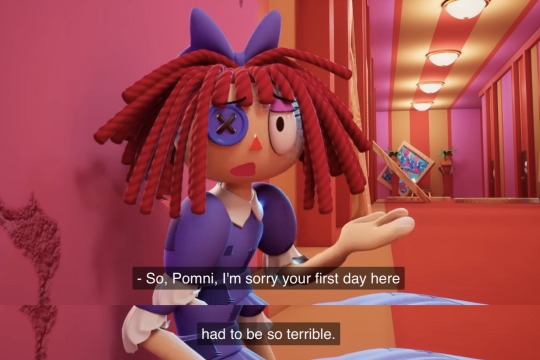
I also noticed a very interesting detail about Ragatha's motion design. I collected all the clips of she approaching while people remaining steady. You know it usually means this person is a sacrificer in relationships.

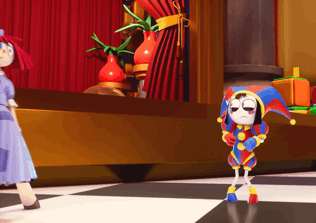




Even when she is not in a good mood about Pomni's “abandon” . Ragatha still approaches and stands by her side.

This gives me the feeling that Caine may have demanded or asked her for help to care the new "sucker".
Additionally, the Kaufmo part also striked me a little. (It may turns out to be simply the pilot needs and my overthinking. But consider I have to wait for months to expect a new episode so why not brain storm.)
So Ragatha is the person who promts to check Kaufmo:
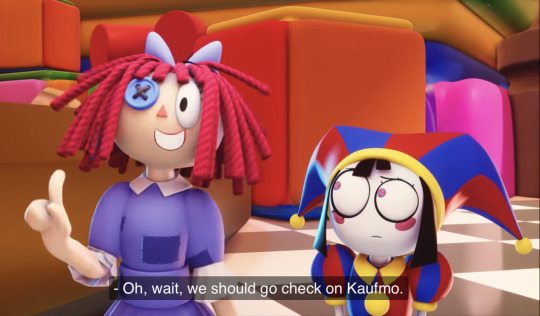
Ragatha: Oh, wait, we should go check on Kaufmo. And I'm pretty sure he'd like to meet Pomni.
While Kinger refuses the idea and says:
I think Kaufmo's gone insane. Last time I spoke with him, he was rambling endlessly about some exit.
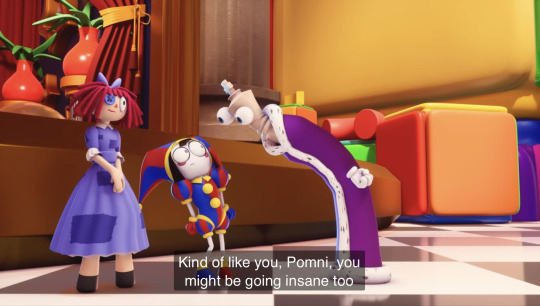
After they went to the carpet, Ragatha mentioned that:
Well, we usually do, when we first arrive, but after a while you start to realize that you really can't leave and constantly chasing an unattainable goal will start driving you a bit crazy. And eventually you get to asking what the point of anything is and you completely lose sight of who you are and why you're even alive and when you reach your breaking point something really terrible can happen.
When she saw the abstracted Kaufmo and she stuttered that the creature might be the “terrible thing” refered to what she said before.
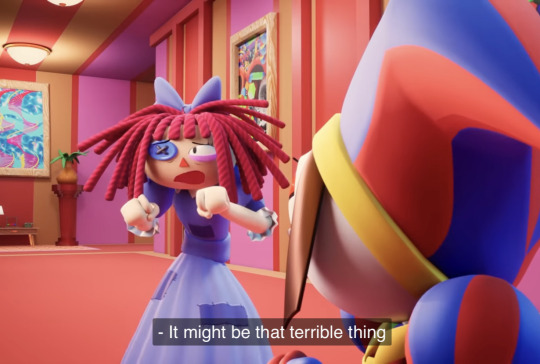
At this time I think we can assume that:
Ragatha knows the pursuing exits could drive people to the breaking point.
Ragatha knows people who breaks will happen terrible things.
Ragatha knows by Kinger (who is unresponisive but still noticed somthing wrong) that Kaufmo is unstable recently.
Ragatha knows what “abstract” is, and someone( people who came earlier than her or Caine) kept warnig/brainwashing her that “ Don’t overthink about exist or terrible thing gonna happen”.
Why Ragatha wants to take Pomni to go check on Kaufmo even she knows he is in a unstable situation?
I think it can be explained that:
She wants to form a stonger colleague relationship with Pomni by taking her to meet the used-to-be-frindely Kaufmo (who liked to tell jokes). or—
She wants to warn Pomni by letting her see “the terrible thing” to stop her from thinking about exit.
By going through all this points, I feel that Ragatha is the most positive on the concept about “No exist”. It looks like she tries hard to prove that there is no way out.
This point is also supported by Caine. And Ragatha hints in a non-obvious way through the pilot that Caine treats them with good intention:
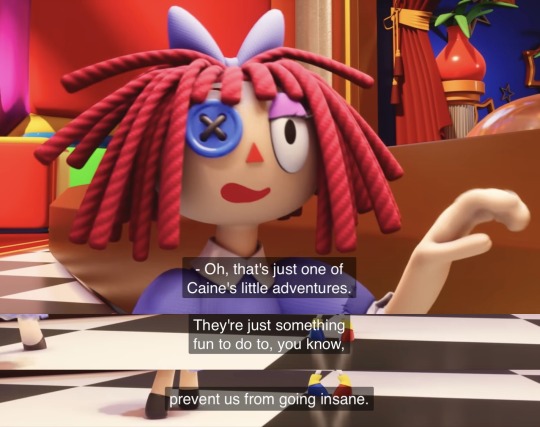

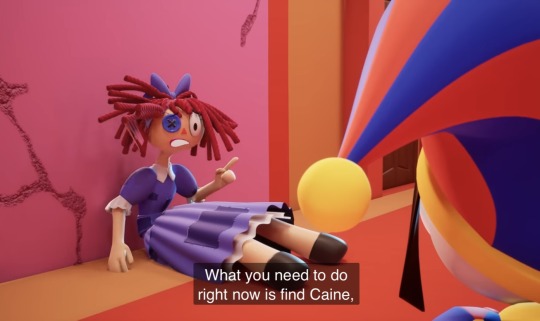
The official site introduces the series with:

So nevertheless, I think Ragatha is still a trapped victim, and the pilot seems to show that she grows a bit Stockholm syndrome and stands by Caine’s side to defend her sanity. That's why she is described as the sweetest optimist.
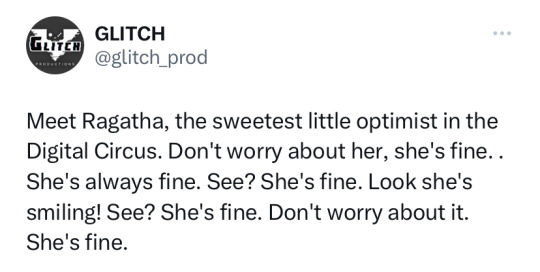
ps:
I find Jax's different attitude is intersting when Ragatha and Kinger mentioned their daily routine:
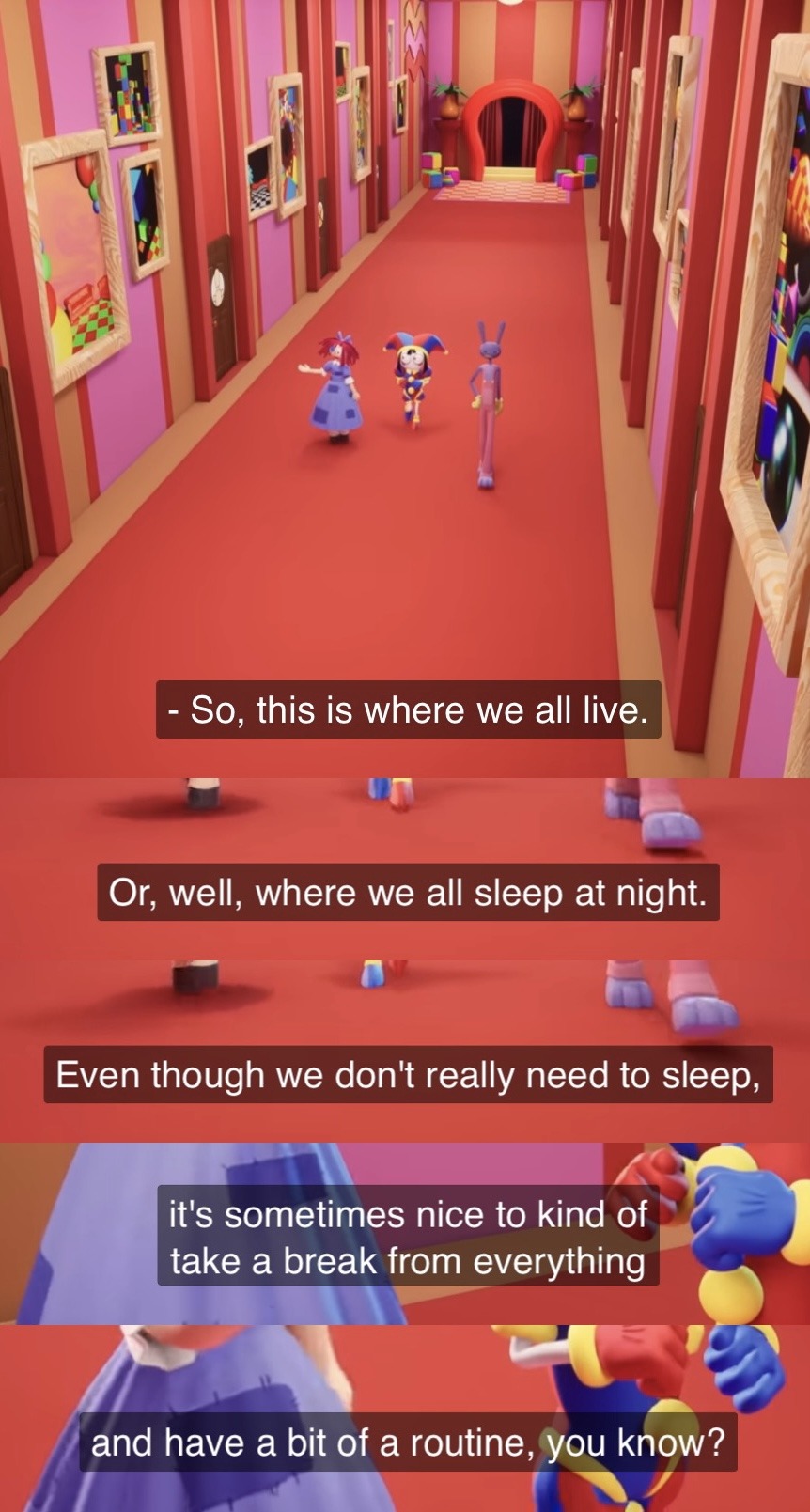
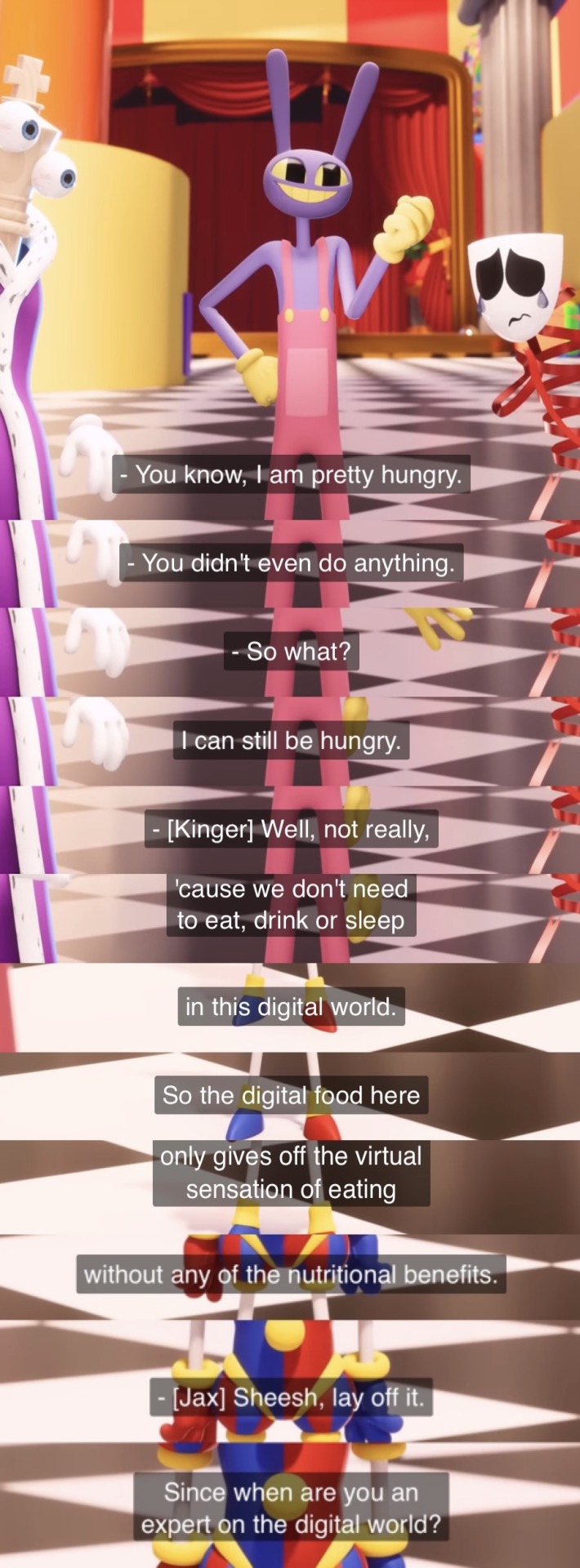
Jax didn't comment on Ragatha explaining their useless sleep routine.
291 notes
·
View notes
Text
Auburn Avenue from the streetcar window, February 2023

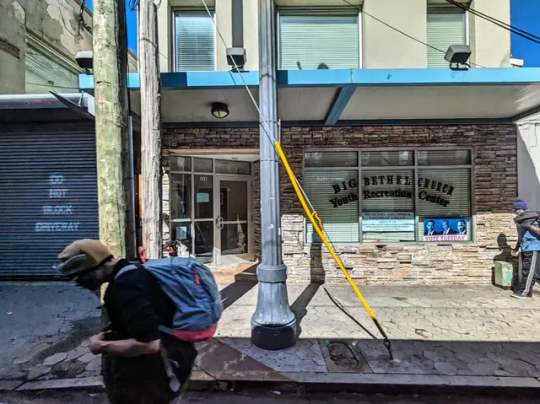
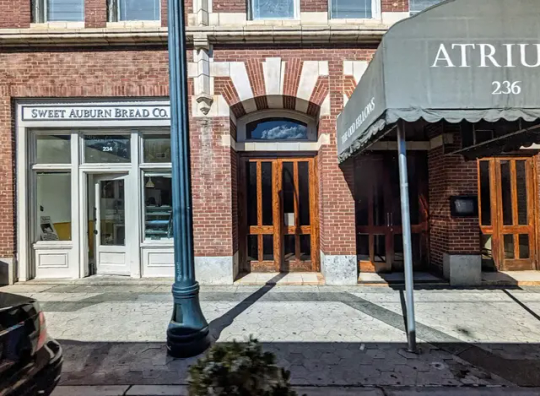
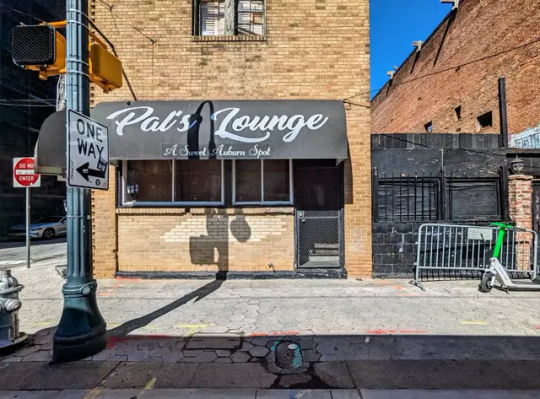


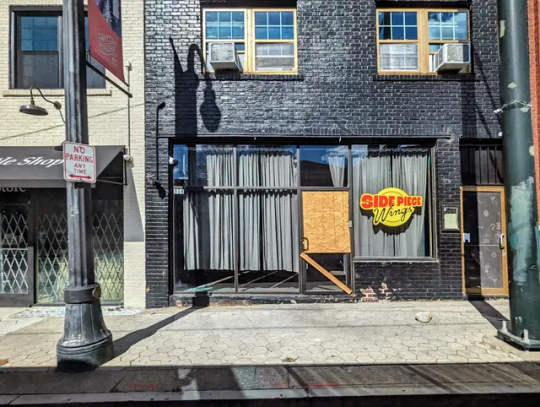
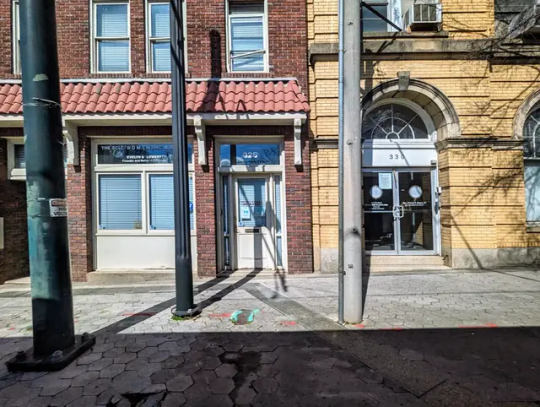
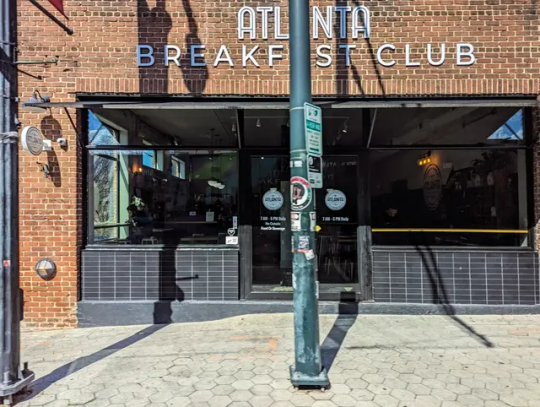
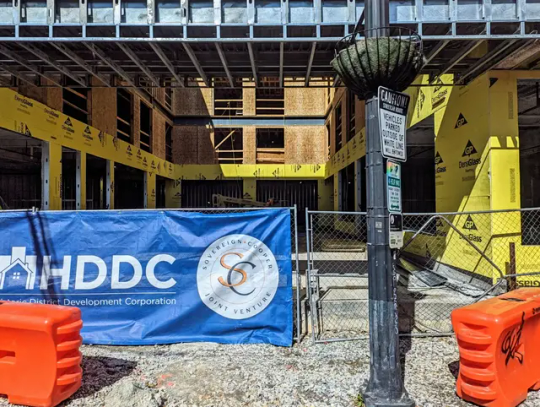
The view from a trip on the Atlanta Streetcar this week, on Auburn Avenue, looking out of the north-facing window.
Honest question: was the streetcar built to serve this street, or to allow tourists to bypass it?
----
There are absolutely some great small businesses on Auburn Avenue worth visiting and I believe more are on the way. But when you look out the window of the streetcar, you see way too many empty spaces and parking lots and blighted buildings.
By which I mean: the overall environment is neither as inviting as it should be for a traveller to randomly explore it, by getting off at one of these streetcar stops, nor is it as supportive of success for these small businesses as it should be.
I can't tell you exactly what the city should have done to correct this issue, and I realize there are a LOT of complicated issues here in terms of who owns the parcels and who should benefit from outcomes.
But at the same time, we've seen Atlanta leaders accomplish big things for major sports events and corporate relocations -- can they not accomplish the same with the basic increments of urbanism, even amid the specific challenges here?
It's been 14 years since the federal government awarded us the $47mil grant for the streetcar, and planning began years before that. We've had a lot of time. How much more do we need?
It took less time than this for the construction of the Downtown Connector and its related interstate highways (mid 1950s-60s) to result in the demolition of part of Auburn Avenue and to screw up its walkability. Why is it taking longer to make this a great urban space and cultural center?
21 notes
·
View notes
Note
I had an idea for a little blurb or one shot, what if there reader is always known for wearing long sleeves and like she’s never seen without them to the point where there’s crazy rumours and reasons people have come up with as to why.
And one day Eddie decides to ask her, and she just takes off her cardigan and she’s wearing a short sleeve underneath and she just has full on tattoo sleeves. So eddie literally just melts for her on the spot.
Hello, friend! Thank you for being my first anonymous requester/prompter. Appreciate it. I hope you like this. It got a little more angsty than I planned, but maybe it's a vibe? xo Rhi
Warnings: mention of self-harm cuts/scars - mind and not at all the focus of the fic; reference to bullying; drug use; no beta (and I'm shitty at proofreading)
Drabble 001
1566 words
“Maybe it's some sort of like, skin condition?” Dustin offered, still knowing the pain of appearing different.
“Where’s your imagination, Henderson?” Jeff asked. “Scars, all the way up her arms, like from doing witchcraft or whatever,”
“Witchcraft?”
“You mean like the cult stuff Hellfire does?” Gareth chimed in, causing most of the boys to laugh. Even Eddie snorted a little.
Yeah, it was a double standard alright. The boys at the table were the first to be picked on for standing out, or trying to fit in, or doing anything at all really. The irony of them watching as you sat by yourself in the far corner of the cafeteria, adding to the already wild echoes of gossip that sounded out wherever you went, was not lost on Eddie.
That’s not to say he didn’t glance over at you, wondering what had changed.
Last year he was meant to graduate and so were you. You’d shared classes, small talk, and a joint every now and then, but he fully expected to never see you again after graduation. Then, you disappeared before the final few weeks of the school year. You were M.I.A. during exams. People thought maybe you’d just skipped out on school and Hawkins entirely.
But, there you were, repeating your Senior year, keeping to yourself like your life depended on it, and the icing on this mystery cake – the length of your sleeves. Rain, hail, or blistering heat, your sleeves would be to your wrists.
Of all the things to think are weird about someone, this was incredibly low on Eddie’s list, if it made it at all. There were logical reasons anyway. When he traveled to the city to see a show, he'd met kids with cuts and scars hidden beneath bracelets and bandages. Maybe whatever caused you to miss the end of last year was fucked up. He couldn’t and wouldn’t judge you for that. Maybe you had converted to a religion that changed how you wanted to dress. Again, Eddie wouldn’t judge you for that.
Really, he wouldn’t have noticed or cared at all, if it wasn’t you.
You, who he remembered from Middle School. You said you thought his act in the talent show was cool, and he’d look even more like a rock star if he let his hair grow long and wild like the thrash metal bands he worshipped.
You, who refused to take discounts on weed just because Eddie offered them. “Call it: supporting local businesses,” you’d laugh, leaving him with his thoughts of you.
You, who would often sit in a way that meant Eddie could copy your answers on maths tests.
You, who he hadn���t spoken to in months, but still occupied a great deal of his mind’s time.
“You sound like a bunch of prissy school girls with all this gossip. What you really should be talkin’ about, is how you’re gonna survive the Cult of Vecna,” Eddie posed to the table, punctuating his statement by throwing peanuts at Jeff.
He dared another quick look over at you and froze when his gaze met yours. Before you could look away, he offered you a smile. Genuine. Warm. Hopefully – inviting. You blinked back at him, not scowling or rolling your eyes, just… confused, maybe.
Two days later, Eddie was spending his Saturday night alone in the trailer. Wayne was at work. Gareth’s house was plagued with interstate family, so band practice was canceled. He didn’t mind, though. It had been a while since he’d just done fuck all.
With rented videos stacked and ready, Eddie packed a bowl and started to watch Fright Night. He was only about ten minutes in before a loud knock on the trailer door made him jump.
“Jesus H. Christ,” he mumbled, glad nobody was there to see him almost piss himself.
He crossed the small space, poising to hear a neighbour talk shit about another neighbour and ‘tell ya uncle, would’ya’ and ‘get a haircut’ and endless trailer park bullshit he could not care less about. As he opened the door though, he stood up straight.
When he said your name, you looked up at him. “Are you okay?” he asked.
“Ah, yeah. Yeah, I’m fine. I just, ah. Do you… Are you still…”
Eddie knew this line of unfinished questioning. “Selling? Yeah. Sure. Come in.”
You stepped up into the trailer, let Eddie close the door behind you. He made no motion to move or say anything. He was just looking at you, a little disbelief in his eyes.
“What do you need? I’m not fully stocked, but if your tastes haven’t changed we should be good,” Eddie said, trying his best to be polite. No, not polite. Kind. Friendly. A friend.
“Yeah, man. You still do pre-rolls?”
“Let me look. Um, take a seat, if you want. Do you want a drink or anything?” he offered, walking backwards towards his room but listening carefully to your reply. You shook your head at him.
In his room, Eddie found no pre-rolls, but there were the means to make them. He came back out to the lounge, plonked himself down next to you on the couch.
“You got some time? I can roll them for you now,”
“You don’t-”
Eddie stopped you by speaking your name. You looked at him. “It’s fine. Let me.”
You nodded, sat back into the couch more.
Eddie started Fright Night again and you half watched it, half observed how skilled Eddie was. His fingers worked fast, neatly. Nothing went to waste.
“So, um, this is a bit out of the way?” Eddie asked. “I mean, if you weren’t sure I was holding,”
“Um. Yeah. Nah. I live here now,” you told him.
“Oh. Cool. That’s cool. So, we’re neighbours?”
“Looks that way,” you confirmed, just grateful he didn’t ask why you had moved from your uptown house to good old Forest Hills.
The conversation paused there, not resuming until Eddie asked if you wanted four, like you used to. He wrapped them in saran wrap and handed them over, swapping you for cash.
Eddie hoped you’d sit for a bit, but you immediately stood and walked to the door.
“Thanks,” you said, turning.
“Wait!” Eddie called, unable to stop himself. You looked at him, your bottom lip sucked in and nervous energy radiating off you. “I, ah… I don’t… know what happened. If something did happen. Or whatever. But if you need anything at all… I’m here, you know?”
You hesitated for a second, then nodded. It wasn’t enough for him. He continued, “Because I liked that we were friends. We were friends, right? And we should be. Now. We have a lot in common. Actually,”
“You mean we both live in a trailer park and are repeating our senior year?” you asked deadpan.
It threw Eddie. For a second, he thought he’d upset you, but then he noticed you weren’t moving to leave anymore. “Yeah… And, we both like… weed… and horror… and there’s gotta be other things, right?”
You studied his face. Eddie had grown up a lot in the years you’d been a nameless moon, orbiting his bright planet. He’d grown into a beautiful person. And it wasn’t just the big brown eyes. He was kind, sweet. You’d seen how he’d adopted all the freak freshmen, taking them under his wing and offering a level of notoriety that meant protection.
“You want to be my friend?” you asked him.
“Yeah. I do,” he answered confidently, puffing his chest out a little.
“You’re not just like, fishing for information? Wanna know where I went?”
Eddie was a little hurt you’d think that about him, but he could see you were more hurt. He shook his head, said as softly as he could, “I kinda just miss you.”
And there it was. It broke you just a bit. You’d missed him too. You missed any semblance of normality. You sighed and stepped close to him, wrapping your arms around his waist. Eddie made a surprised little ‘oh’ sound but quickly wrapped his arms around you, squeezing tight. He waited until you stepped away first, not wanting to spook you.
“So, Fright Night?” you asked, moving back to the couch, casually lifting the knitted jumper you were wearing over your head, throwing it aside.
Eddie’s jaw fell slack. Your back was to him, but you wore only a tank top, and the colours and patterns all up your arms were so vivid. Covered in bright illustrations, you were a walking piece of art. He’d managed to close his mouth and follow you to the couch by the time you sat down.
He sat next to you, turning his attention back to the film, scared to even look at you. There was a smirk on your face as you noticed how still Eddie had gone.
“If you let me share a bowl, I’ll let you ask about the tattoos,” you said.
“Oh, thank FUCK,” he breathed out. “You’ve always been cute, but, ah, Jesus…”
You laughed at him, a proper laugh, one that sounded unfamiliar to you. Eddie had grabbed your arms and was studying the tattoos so closely you thought maybe he was trying to commit them to memory. He looked at you, those goddamn big puppy dog eyes.
“I really fucking missed you,” he whispered. “And I’m glad you’re here.”
#Mine#Drabble#Eddie Munson#Eddie Munson x Reader#Eddie Munson/Reader#Eddie Munson Drabble#Rhi Drabble
408 notes
·
View notes
Text
so while rewatching a show for the first time again isn’t possible, rewatching the rookie through a different lens is because let me tell you how interesting it is to rewatch scenes as chenford is canon.
2x19: the q word for example
this conversation with tim and lucy - “what are you so happy about?” “what? nothing? can’t i smile?” “you’ve just been doing it a lot lately.” — this is so ironic because who else has been smiling a lot lately? tim. i don’t think we’ve ever seen this man smile so bright or so much and it’s so funny that he was the one to ask lucy this in season 2 when we’re now in season 5 and he’s so giddy and in love.
tim’s rule about no personal life talk in the shop. the little interaction of “my personal life is none of your business” “finally. there’s hope for you yet.” — it’s a little fun, comedic moment between the two but it also highlights how she’s literally the only one to have successfully broken that rule, time and time again because of how much personal life talk they’e had through the years. i think it’s safe to argue that out of everyone they know, lucy knows tim the best and tim knows lucy the best. ALSO THE FACT THAT HE’S NOW PART OF HER PERSONAL LIFE????
tim talking to chris’ training officer and as he does that, how his gaze travels to lucy like he’s always worried about her and it’s so sweet to see the evolution of how he worries and how he treats her. i think back in this episode, it was more tied to the aftermath of what caleb and rosalind put lucy through but he’s always been protective over her. 5x08 had such a great moment of this when the man with the collar was standing in the middle of the street and not only did he rush her toward him when they thought it was going to go off, he literally shielded her. it’ll be so interesting to see how this continues to be at play now that he’s in a different division because tim isn’t about to let go of that protectiveness
the parallel of the “gun hand” between 2x19 and 5x12.
when they’re driving and lucy asks if they can “talk about what happened earlier” — i just love how even in their earlier years, they’ve always communicated so well?? with the exception of 5x02 lmao. but just lucy addressing the conflict and tim not shutting her down and engaging in that conversation with her.
*snickers* lucy shooting down the label of emmett being her boyfriend because we all know how much she’s always steered away from labels but called herself tim’s girlfriend after a few weeks. heck, technically she called herself the mother of his children on their second date.
“you may be thirty days from crossing the finish line but the only thing that happens when you cross it is that i won’t be there to keep you from washing out ... or worse, so you better believe this next month is going to be tough” — omg, there’s so much to unpack here that i could probably make this its own post but let’s talk about it at a high level. as her training officer, tim was always hard on her. the moment he realized that she was worth his time to train, he never made it easy for her because he knew she could take it. he said it too, back in 3x11: “you are a kind and insightful person. you see the good in people. so much so that i had to show you the world can be a scary place.” he trained her not only ensure that she could hold her own but that she’d be confident in her ability to to do which she 100% can. like obviously a lot of it is her, to which he’s also acknowledged, but he supported her in getting there. would lucy be where she is had she had any other training officer? probably but the thing tim did that i don’t think anyone else would have, was challenge her strengths for her to be able to grow in that area too. lucy can handle herself, she’s proved it time and time again whether it’s been while uc or like with the dv situation where she took on the boyfriend and talked down kyra. anyway, what could be really intersting here moving forward is how their dynamic on the job shifts now that they’re not in the same department because more likely than not, they’ll still work together but what’s going to happen when lucy makes a life or death decision on the clock that worries tim but can’t do anything about it because she doesn’t answer to him anymore?? soz, i love some good old angst and i hope this is a place where we get it because i love protective tim, badass lucy, and their deep conversations.
the “i thought we weren’t going to discuss my personal life [...] we’re friends” is so funny because of how they spent their last shift on patrol together talking about their personal life and trying to solve that conflict but also, no lucy bb, you’re not just friends, you’re boyfriend and girlfriend :-))))) you just didn’t know it then lmao.
#the rookie#chenford#tim bradford#lucy chen#afljasdfkl#i kind of want to make this a series because i have so many thoughts as i re-watch it lmao
85 notes
·
View notes
Text
first impressions from last night, for my records lol written as i went. warning, it's not great
tortured poets department: wtf is with all that synth it sounds so bad so high so not on theme wtf is this her voice doesnt sound like it's trying at all it's strolling and so boring; she's just giving us nothing
my boy: this is like if out of the woods production was less good and also didn't fit the theme and lyrics and it just is bAD so bad, like why, it's like a bad imitation that doesn't make sense!!!!!! the drum and synth was nice once and then i'm sorry you actually have to make it coherent not just re-use the same things and patch them together because you have no new fucking ideas !!~!!!!!!!
down bad- she will say she's an alcoholic and she learned how to say fuck so she overuses it like a teenager now, great. matty breaking up with her?? sounds like he did but feels like lies tbh
so long, london- wow finally getting to hear about joe. better match between lyrics and music. better gradation, better buildup, some pretty good lyrics, overall, decent
but daddy i love him- something i would actually support and be hyping if she had come out as bi, or gay, or had stuck with matty, had defended any part about him, had continued dating him longer than she did, had actually dissassociated from her dad, had actually done sonmething rebellious truly. but she reverted back to a fucking footballer her dad picked for her so how fucking bold to release this now when all this energy is gone. the nerve. she should've kept this to herself or release it last summer it's actually UPSETTING that she would release this now when she is in such a picture perfect daddy approved relationship.
fresh out the slammer- uh….okay…undewhelming "taylor, please. do a drug. any drug. and report back. 😞😩"
florida!!!- definitly the best!! florence has the best moments of the album. actually intersting vocals, attitude, style, bocal beauty, and interesting music overall. just want her to sing only, feels like taylor is impeding on florence and i want florence to come back everytime she stops singing. florence actually adds flavor to this, whereas taylor is just...flat and uninteresting??? yikes
guilty as sin?- actually like it!! guitar and drum yes baby. though oh pooor little baby you desire someone else. you are now linking yourself to jesus, you're so guilty but you havent done anything. okay okay but the sound is actually good and i would listen again. the grandiose religious comparisons are a plenty on this album man
i can fix him- taylor you are not grimes. you were not married to elon musk. stop religion, stop it. my god how embarassing this one should not have been public. actually burst out laughing at that last heavy "can't"
loml- thank you for actually telling us something. that was the easiest to get through without interrupting. joe song. good words, good simple ballad.
i can do this with a broken heart- this is funny genuinely, funny, i would hype that, wow
the smallest man who ever lived- the karlie song? want to look more into the lyrics.
the alchemy- ew ew ewterrible badddddddddddd you can't write a good song about football, please stop trying. this is so bad i'm actually so mad please delete this
clara bow- so disapointed! i expected more from this one, but it's another ''the lucky one'' or "last american dynasty" etc...nothing new, so it doesn' really compel attention...
i listened to who's afraid of little old me last:
who's afraid of little old me?- oh god girl. make this make sense. this is embarrassing, why dont you tell us why you were raised in an asylum and what they did and that instead of throwing oh boohoo me i have it so bad.
this is just her style now, i guess. :|
#we recorded the whole listeneing experience and its like two hours long so that'll be funny to revisit someday x)#ah well#i thought it would be equal to a little better than midnights...........oh boy#this is definitely the worst album for me#main words about this are: embarrassing - boring - unimaginative#i can't really believe but also i can all the signs have been here#it's just that we KNOW she can make good music. but where is the music here??? where#really sad#ttpd#ttpd criticism#tsmtaylor swift#i have so many thoughts
8 notes
·
View notes
Text
My parents are the coolest parents because they’re willing to be lame. Let me explain
Ever since I was little, they’ve always told me if I was uncomfortable somewhere, didn’t want to hang out with someone, or literally anything, I was allowed to throw them under the bus to say they wouldn’t let me or I had to leave. They think it’s so funny to come up with excuses and we usually cycle through a few before coming up with new ones. I have texted them so many times in life or in hushed whispers told them over the phone at a friend’s house to make up some excuse of why I have to leave and it has put me in the position that I know I can always trust my parents.
In the time that they are “lame” because they are parenting me and it’s not just because I want to have a skip free card, they do it for the best reasons and I know they have my best interests. For example- I was NOT allowed to watch Nickelodeon in any sense because they felt the content was disturbing and had intense sexual undertones. Now we know that it all did. They pushed me to cut out certain people in my life as they saw they were evil and toxic. My life improved greatly without them. I wasn’t allowed to have a device until I was old enough to go out on my own with friends and even then, it was under parental control so that I wouldn’t be rotting my brain. In times when we were dirt poor when I was little, they pushed and saved to be able to give me a great education and fuel my interests instead of throwing me in front of a TV and hoping for the best. My parents told me no matter what, if there was a book or some sort of hobby I wanted to explore, they would do their best to support me. The first Christmas I remember, I had started getting into painting and I walked downstairs to find a Mellisa and Doug easel with a paper roll, paint, paint brushes, an apron, and a paint cup. They spent MONTHS saving for it and it still means everything to me as I get older. I grew up with their cartoons and books from their childhoods and a few approved newer ones.
Tonight I told my dad he needed to give me a curfew. We have prom tomorrow and the class wants to have an after party until 1am at a place that’s thirty minutes down the interstate in the middle of nowhere. He told me ten o’clock and I told him that prom didn’t end until then so he pushed it to 11
I love that my parents are willing to be “lame” even at their own expense or even if sometimes, I can’t see that it’s in my best interests until later.
9 notes
·
View notes
Photo
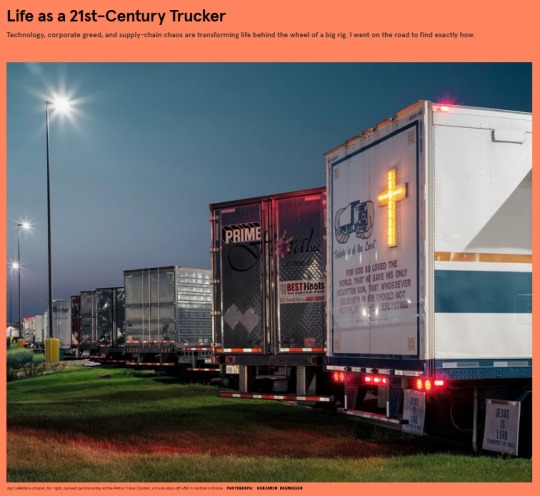
Life as a 21st-Century Trucker
Technology, corporate greed, and supply-chain chaos are transforming life behind the wheel of a big rig. I went on the road to find exactly how.
by Andrew Kay
1
When Jay LeRette preaches the Word, he transforms from a mild Midwesterner—one who loves country gospel, rides a horse he has trained to roll over and grin, and has, himself, a whinnying laugh—into a human incandescence. Sixty-four, 5' 5", and dressed like a cowboy, he increases in stature; his voice crescendos to cracking. “The devil’s learned to use us and abuse us, to beat the snot out of us,” he says, then uppercuts the air. “Amen, Chuck?” A man in the second row with a great, ZZ Top–like beard croaks amen. “The devil mopped the floor with me,” LeRette continues, and mimes a janitorial sweep. “But God—but God!—” he shrieks, pounding the lectern and leaping, “—had compassion on you and I.”
It’s a weeknight in December 2021, getting toward Christmas, and I’m sitting in the trailer of an 18-wheeler that’s been repurposed into LeRette’s chapel. It’s parked, permanently, at the Petro Travel Center, a truck stop off Interstate 39 in northern Illinois. All around it are acres of commercial trucks, stopped for the night and carrying every kind of cargo: cows, weed, pro-wrestling rings, grain, petroleum. One side of LeRette’s trailer reads “Transport for Christ"; beside it, a neon cross gleams in the dark. John 3:16 adorns the back end: “For God so loved the world, that he gave his only begotten Son, that whosoever believeth in him should not perish, but have everlasting life.” Next to the scripture are two godly hands cradling a truck.
All across Illinois there are tornado warnings. Menacing gales rip through the parking lot, making the trailer shift and groan; we are beyond the reach of any siren. Yet every minute, the door opens and a new trucker walks in. Each takes his place in one of about 20 chairs arranged in rows toward the middle of the chapel, which is pretty minimalist: framed Bible verses along wood-paneled walls, a lectern at the front, an office and bed in back.
The drivers—all men tonight—have come straight from the road, and their bodies suggest the slow entropy wrought by bad food and decades of sitting. All but one appear over 50. Some know each other: When LeRette kicked off the service by belting out hymns and strumming his guitar, a straggler entered, and several men called out, “Rip!” Rip hustled in and high-fived or hugged them.
LeRette hands out copies of the King James Bible and asks us to open to Luke 10:25. Chuck seems to be back in Exodus, and when LeRette repeats “the Gospel of Luke,” Chuck responds, “Oh, I thought you said Mötley Crüe.” They are irrepressibly funny like this, suddenly schoolboys.
LeRette asks John, a small, older man in a hoodie, to read the verse. “A certain lawyer stood up and tempted him, saying, ‘Master, what shall I do to inherit eternal life?’” He struggles to sound out “eternal,” but the men nod along, supportive, patient.
Then LeRette interprets: A skeptic is trying to trick Jesus into contradicting Judaic law, into uttering a heresy. “Now how many know he ain’t gonna do that? Jesus is the living word of God, amen? There ain’t no trapping our savior.” Chuck calls out, “They tried to trap him for three years,” and LeRette answers, “C’mon, that’s right!” The quickness with which he beckons these road-weary men into call-and-response is extraordinary. He stamps and claps, sidesteps and kicks till his lungs falter. “Jesus carries our load, amen?”
After the sermon, John says meekly, “I have a pain in my shoulder. Would you try healing it?” LeRette agrees and hurries past us to his office, returning with a vial of frankincense. He approaches John and daubs his forehead, then places a hand on his ailing shoulder and calls out: “Father, we pray against whatever it is that’s trying to come against John.” The other drivers rise, surrounding and placing their hands on John or kneeling before him where he sits, eyes closed with one hand lifted upward. He awakens under their touch, smiling serenely.
Each trucker gets a turn at the center of the group. Then they turn toward me.
“Andrew, may I anoint you?” LeRette asks. There’s no time to think, so I say,
“You may,” and straightaway he applies the oil to my forehead.
“Just flood through him, oh God, like liquid fire,” he intones.
Then he starts speaking in tongues, a tumble of manic syllables he lets fly while the long-haulers encircle and lay hands on me.
“Father, I commit Andrew to your care,” LeRette concludes.
2
I have come here on a strange sort of mission: I want to find out what’s gone awry in American trucking. For more than a decade, freight-haulers have been held up as the poster children of a supposedly inexorable fate: 2 to 3 million drivers out of a workforce of 3.5 million—one of the largest in the US—are slated to be sidelined by AI. Yet recent years have hardly borne out that doomy prophecy: The self-driving industry has been humbled by fatal crashes, scandals, a federal investigation, a pedestrian death, negligent homicide charges, and stillborn business promises. Meanwhile the pandemic has wreaked havoc on our supply chains and made us more dependent on truckers than ever—more beholden to an industry that, for all its hugeness, still can’t keep pace with our needs. It’s an industry that dwarfs all other forms of domestic freight transport: 72.2 percent of the total tonnage of goods shipped within the US is moved by truck (air transport moves less than one-tenth of 1 percent). Investors—inspired, doubtless, by the shipping delays and logistical breakdowns that threaten to upend the economy—have sought furiously to augment or outright replace that workforce, pouring money with redoubled fervor into automation since 2020. But they have found scant success: What we have, ironically, is a nationwide shortage of the very workers alleged to face obsolescence.
What’s behind that shortage? And how exactly is technology altering life inside the cab? I want to know why 90 percent of the people who enter this profession quit within the first year; why a red-pilled faction of its members—affronted by a vaccine mandate that was, one senses, only the last in a litany of grievances—formed the Freedom Convoy and People’s Convoy last winter and spring, blocking border crossings between the US and Canada. I hope to understand, too, how the relatively few truckers who stick around sustain themselves: the myths they live on and the shrines to which they come, parched, to be replenished and raised up.
Shadowing LeRette, a holy therapist whose vantage point on this world is at once intimate and panoramic, I hope to glimpse some answers. Then, because I need to see the road for myself—need to be in a truck—I’ve arranged to ride shotgun with a person named Jason Childs, a 41-year-old trucker and adventurer I’ve never met but with whom I’ve very sensibly agreed to share a cab on a two-day route to Boston.
The day after my anointing, LeRette and I head to the main building of the truck stop, where showers, slot machines, and a diner are. He’s decked out in a big parabola of a cowboy hat, a custom black Carhartt jacket that reads “Victory in Jesus,” Wrangler-ish denim, and dark-brown cowboy boots. He approaches the PA system to advertise tonight’s service, which begins at 7 pm, then we grab a booth at the Iron Skillet, where he runs through his personal history over lunch.
As a young man, LeRette was such a wayward punk that he lowers his voice recounting it all. He stole things (“I liked motorcycles”), fist-fought, and assaulted police; he drifted from detention hall to drug ward to psychiatric hospital. At last, he went to prison for theft. One night toward the end of his yearlong sentence, he sat alone in his cell, thumbing through a Bible and crying; he wanted to be delivered, wanted to climb clear of the devilry that had devoured his early life. In the darkness, he became aware of something—a preternatural light. Some being or intelligence that he instantly identified as the Holy Ghost had come to dwell with him. He stopped struggling, felt clean and clear-headed, drained of the defiant energy that had twisted him crosswise with the world. At 6 am, he showed up for breakfast looking serene. “What’s got into you, LeRette?” other inmates asked. “I found Jesus,” he said. They responded: “Brother, you need him!”
He started converting other prisoners, and upon release, began evangelizing in the prisons, jails, and detention centers he knew so well. He made a name for himself bringing the gospel to the most hostile of places, a perilous early ministry that he recalls with what sometimes seems like preacherly embellishment. In Chicago one night, he claims, someone held a gun to his forehead and pulled the trigger. He raised his arms to the sky and cried, “Jesus!” only to discover that the chamber had been empty. Another time, LeRette says, leaning in, while he was witnessing to a crowd of bikers at a Hell’s Angels bar in Rockford, he saw they were getting blow jobs as he spoke. He lifted his eyes and went on preaching.
LeRette supported himself as a mechanic at a Del Monte Foods factory, where he met his wife, Karen. One day in 1991 he got a call from an investor who was planning to build a new truck stop in Rochelle. He wanted to install a chapel there and appoint LeRette as its preacher. LeRette was dubious. He thought his calling was to be a prison chaplain—and besides, the lot was little more than an expanse of corn at the time. But the investor convinced him that if they built on this blankness of prairie, the truckers would come.
The chapel was furnished by a nondenominational ministry—Transport for Christ, now TFC Global—founded in 1951 to serve an industry that was booming thanks to the highway system. The name, like so much about LeRette’s world—its mingled grotesquerie and humor, its wild manifestations of grace amid grimness—seems drawn from Flannery O’Connor. Today, the ministry’s sanctified semis are stationed across the country. The souls LeRette encounters—thousands of truckers come to him each year—include regulars who pass through weekly, plus others he sees once and never again. They provide LeRette’s income in the form of donations, slipped into a box at the chapel or sent by mail. Some truckers have been donating monthly since the chapel opened.
LeRette lives with his wife in a farmhouse half an hour south of Rochelle. “I could never be a truck driver,” he concedes. “Too much of a homeboy.” But some nights he crashes on a couch in the chapel office. Once, he was rocketed from sleep at 4 am by a pounding at the door. “Get up, preacher,” said a voice. “You’re going to meet your maker.” LeRette opened the door and saw an enormous man who’d come to the chapel the night before. “I hate everything about you,” the guy said. “Your voice, your looks.” He seemed poised to murder LeRette when another driver entered—a jacked ex-bouncer who perceived the emergency and rushed forth, demanding the intruder back off. The three talked of Jesus until sunup, when the first guy broke down, agreeing to be born again.
This, LeRette says, is common: A trucker will come at him with a rage that turns out to conceal a desperate desire for forgiveness and love. “I think if there’s one word to describe the trucking industry and the drivers, it would be lonely,” he tells me. They are on the road for weeks, sometimes months, at a time. If they have partners or children, they carry the guilt of missing date nights and soccer games. If they fight with their spouses, they relive the spat numberless times on the road, the work itself becoming a brute metaphor for the emotional freight they carry.
In this sense, LeRette has become the prison chaplain he felt called to be. If trucking was once a lifestyle of freedom, it is increasingly one of deranging captivity and surveillance. During the week I spent at the Petro stop, drivers fumed to me about the electronic logs they must now use—tablet-shaped devices mounted on their dashboards that monitor everything they do: all their driving time, their fueling up, their loading and unloading, their napping.
This particular digital intrusion is the result of federal legislation. A law passed in 2012 dictates that truckers work a maximum 14-hour workday, spending no more than 11 hours behind the wheel with three hours of rest time. If they violate this law, they risk being yanked from the road and fined, and might mess up their carrier’s safety rating, which could deter customers, creditors, and insurers. Many drivers concede that the time restrictions arose in response to reckless behavior. “Back in the day they used to do lines of coke off the freakin’ dashboard,” one Illinois-based driver recalled. That, he explained, is how one got to New Jersey overnight. Still, the truckers I spoke to would rather decide for themselves when they’re tired.
The newer trucks are so computerized that they provide what might be termed “AI helicopter parenting”: a development supposedly meant to increase safety and fuel efficiency, but also, I’ll come to suspect, a compensation for fast-tracking newcomers through training and into driver’s seats before they’re ready. Each state-of-the-art Peterbilt in the Petro lot is equipped with at least 10 computers that govern everything from steering to braking, reducing many truckers to what are known in the industry as zombified “steering-wheel holders.” The AI alerts a dispatcher if anything aberrant happens—an abrupt stop, a missed turn—and if a driver changes lanes suddenly, the truck will defy him, jerking itself back. (The driver can override this function, but many truckers say it remains disruptive, even dangerous.)
Then there are the cameras. Ascending the cabin of one semi, I see a black gadget affixed to the windshield like an old-school GPS, its lens trained on the driver’s seat. Such cameras protect companies from liability in the event of an accident—they can prove that a driver wasn’t acting irresponsibly and thus isn’t at fault—but truckers deplore them. “Some drivers,” LeRette says, “tell me they’ve got cameras pointed back in the sleeper.”
On a thriving Reddit community called r/Truckers, which hosts more than 100,000 members, one popular post begins, “Hello, fellow piss jug enthusiasts,” and goes on to complain that its author’s employer has announced it will start implementing driver-facing cameras. Hundreds of users chime in to say that they’ve quit for this reason. “I’ll only accept a driver-facing camera,” one comments, “if the company owner gives me a 24/7 unrestricted stream into his house.”
3
LeRette pays the bill and I follow him to the door. We pass a towering driver at the buffet. LeRette stops, invites him to the evening service, and asks where he stands with Jesus. “I tried to read the Bible cover to cover last year,” the man says. “But I got this phone in my pocket—it got a demon in it. Takes me to sites I don’t wanna go.” He claps me on the shoulder and bursts out laughing, and LeRette hurries off.
I decide to stick around, turning back toward the duskily lit dining room. The clientele is a microcosm of the workforce to which it belongs: older, racially diverse, overwhelmingly male. Of the 3.5 million people who work as truck drivers in the US, 75 percent are over 40, roughly 40 percent are not white, and at most 10 percent are women.
An ambient antisocial quiet hangs in the air: The e-logs and Covid, I’ll learn, have strangled the camaraderie that once flourished at these places where truckers would hobnob heedless of mandated resting and driving intervals. Most drivers sit alone, scrolling on their phones or glancing at the Fox News that drones on the TVs. Vacant booths are marked with a libertarian poutiness: “Due to the IL governor’s orders, this booth is closed.”
At one table, though, three men sit together laughing. I blunder up, introducing myself, and they invite me to sit. Their names are Junius (“JuJu”) Silas, Eric Brown, and Nick Rains; they haul equipment for big touring acts. They’re the drivers of the WWE trucks parked beside the chapel: Throughout my visit, because of the trailers’ adjacent rear ends, André the Giant’s likeness sits beside John 3:16.
I ask them why the industry has a 90 percent attrition rate within the first year. All instantly respond: “No money.” They describe a predatory apprenticeship system that conspires against new drivers seeking to enter the profession. The industry is made up of thousands of mostly small-fleet owners—95 percent of them with 20 trucks or fewer—but dominated by about two dozen giant companies that serve as its gatekeepers. These megacarriers often house schools where some 400,000 new truckers receive commercial driver’s licenses annually. The companies entice people with promises of financial plenty, even as they ensnare them in “training contracts”—binding agreements that require them to drive for the company at below-market wages for a year in exchange for training or else be hit with an exorbitant fee for that training, to be paid off at high interest. Many drivers stick around for the full year to avoid those fees, enduring what amounts to debt peonage.
Silas, a slyly charismatic man with graying dreadlocks, tells me: “The average pay per mile for a fresh driver—your shoes still on? 26 cents.” Actually, he notes, you make half that, “because you’ve got a split seat”—meaning it’s common for companies to pair new drivers in a truck, where they take turns at the wheel and split their earnings. “It don’t make child support,” Silas says. “It don’t make electric bill,” Brown says. “You don’t have a girlfriend,” Silas adds.
To make matters worse, drivers who leave their training contracts early risk being blackballed by the carriers. This past summer and fall, the US Department of Justice oversaw a high-profile antitrust lawsuit in which several truckers sued nine megacarriers for colluding with one another not to hire them. In November, they reached a $2.1 million preliminary settlement.
Freight companies have been warning lately about a trucker shortage so dire that it’s causing supply-chain and delivery delays nationwide. But drivers like Rains see such warnings as disingenuous, given the way megacarriers treat new drivers: “Like cattle.” What’s more, the DOJ has said that the blackballing of drivers who break training contracts may be contributing to the shortage. According to the American Trucking Associations’ 2019 driver shortage report, there are now nearly three commercial driver’s license holders for every job that requires one in the US: strange stats to square with a shortage.
All day I ambush drivers who greet me with an annoyed suspicion that gives way to a thirst for talk so desperate that within minutes I couldn’t shut them up if I tried. I buy them coffee, soon finding myself at the center of small congregations of truckers who’ve shifted seats to join. They want me to understand that freight companies talk up the shortage because they’re angling for federal and state grant money to subsidize the cost of training new drivers. They say that taxpayers are unwittingly funding the turnover that enables this deception to continue—providing what Todd Spencer from the Owner-Operator Independent Drivers Association calls “corporate welfare” to companies that can seem ripe for treatment by Upton Sinclair. Last year, Rains received a payout from the carrier CRST, where he got his commercial license, after it had reached a settlement with drivers who’d filed a multimillion-dollar class action against it for lying about “free” training, overcharging them for schooling, and failing to pay them minimum wage. The same company saw 150 to 200 sexual harassment claims filed by student drivers against their trainers in 2018 and 2019; one woman alleged her trainer raped her, only to be told by CRST that without video footage they could do nothing. They charged her $9,000 for her training and effectively fired her in retaliation. She sued the carrier and received a $5 million settlement in 2021.
LeRette’s sermon the night before (“The devil’s learned to use us and abuse us!”) starts to strike me as an allegory about a more worldly, if faceless, kind of fiend. “The trucker shortage is propaganda,” insists 62-year-old Jerry Adams, who hauls flour, records country music, and claims to have dated one of Dolly Parton’s sisters. (Adams says she once called the chapel mid-service and sang to the truckers on speaker.) For him, the politicians who keep rewarding the megacarriers bear ultimate responsibility. Many drivers agree, blaming their mistreatment not just on corporate avarice but also on Washington. In 1980, the Motor Carrier Act deregulated trucking, making it easier to get a commercial driver’s license but also making the job far less remunerative. “The worst thing they ever did was deregulate it,” says Dean Martin, who began driving in 1994. “What I made when I started … I make less now.”
Adding insult to injury, truckers are barred from overtime pay by the Fair Labor Standards Act of 1938, even though most of them work at least 70 hours a week—especially when you figure in the obligatory rest periods imposed by Congress in 2012. (A bill called the Guaranteeing Overtime for Truckers Act, sponsored by several senior Democratic US senators, is making its way through Congress.) The average US trucker salary in 1980, adjusting for inflation, was $110,000; today the median is $48,310. This despite research by industry experts like Daniel Rodríguez showing that the probability of truck crashes indirectly correlates with pay and experience, plummeting among long-standing, well-compensated drivers.
According to the American Trucking Associations, though, the trucker shortage is quite real—the product of an aging workforce, the industry’s struggle to recruit women, and the ballooning of freight volumes thanks to our rapacity as consumers. All this, exacerbated by Covid, has created a tight labor market in which fleet owners—primarily small outfits with a handful of trucks—are fiercely competing for the same limited pool of drivers. They are doing so by increasing their pay rates (up by as much as 25 percent since 2019) and enticing truckers with five-figure signing bonuses. Jeremy Kirkpatrick, a spokesperson for the ATA, stressed to me that many truckers are now regularly moving from one signing bonus to the next in a game of musical chairs that leaves fleet owners frustrated. “This churn, or poaching, is what really inflates the turnover rate,” he said.
It’s possible to reconcile these rival accounts: Scummy treatment of apprentice drivers is leading to massive hemorrhaging at the entry level and thus to a shrunken labor force that innumerable fleet owners must strenuously fight over. It’s a landscape akin to academia, the world I came from, where a great share of grubby work is done by an insecure class of entry-level laborers—grad students, adjuncts—striving desperately to join a small, cosseted class—the tenured—who enjoy clout, protections, and a lifelong career trajectory.
While the pandemic’s supply chain woes raged, venture capitalists funneled more investments into autonomous-truck startups—$11 billion from 2019 through 2021—adding fresh precariousness to a trade already beset with uncertainty. These investments have coincided with a rush of optimism among engineers and lawmakers alike. In August, US House representatives, fired by a conviction that “this technology is moving so quickly,” formed a bipartisan “autonomous vehicle caucus” aimed at “establishing the right policy conditions to increase the use of AVs.” “It’s closer than you might think,” Dmitri Dolgov, the co-CEO of leading AV company Waymo, wrote of a self-driving future last month. “Freight volumes will increase, demonstrating how AVs could help untangle supply chains and backfill the immense shortage of truck drivers.”
And yet when one looks closely, this boldness is everywhere haunted by doubt—a rooster-strutting that never quite convinces. One leading autonomous-truck startup, TuSimple, executed its first entirely driverless truck run in Arizona while I was at the Petro stop. An 80-mile nocturnal drive from Tucson to Phoenix, it was hailed as a success—but tellingly, a lead vehicle drove five miles ahead of the truck, scouting for obstacles, while an escort, ready to intervene, trailed it closely, and law enforcement vehicles stalked it from half a mile behind. In 2020, TuSimple struck a deal with Navistar to engineer autonomous trucks; the companies secured about 7,000 orders, and the trucks were scheduled to enter production in 2024. Last December, though, they severed their partnership. A rival, Aurora Innovation, told me in March 2022 that it was aiming for the end of 2023; it has since pushed this date to the end of 2024 and even mulled the possibility of a sale to Apple or Microsoft.
In fact, there is little consensus about not just when but whether self-driving trucks will actually come. Truckers tend to bristle at the suggestion that an unmanned digitized truck could perform their job; they point to the dexterity involved in backing into a tight space, even as engineers maintain that this is what autonomous trucks do best—a mere matter of physics and geometry. For their part, researchers like Maury Gittleman and Kristen Monaco at the US Bureau of Labor Statistics stress how truckers’ jobs include more than just driving; they’re tasked with loading and unloading, customer service, and addressing the manifold safety concerns that arise on the road—all duties that “are less susceptible to automation.” Even among engineers, there’s little agreement about the viability of autonomous trucks. Anthony Levandowski, the cofounder of Google’s self-driving vehicle division and now CEO of the autonomous-truck company Pronto, told me he thinks the technology has reached an impasse owing to the trucks’ inability to “understand the world”—to anticipate and react to sudden, spontaneous occurrences such as a driver cutting them off. So the timeline remains uncertain: “Is it five years or 50?” Levandowski asks without an answer. Meanwhile, companies like TuSimple (which refused to talk to me) depict themselves as motivated by a noble desire to devise a solution to the punishment and peril of trucking. The logic, apparently, is that they will relieve an immiserated workforce by rendering it obsolete.
Afternoon at the Skillet bleeds into evening. Every so often a robot voice issues through a loudspeaker: The shower is vacant, the next ticket number is up.
A portrait sharpens into focus of a job that entails both mortal danger and wilting tedium. On one hand, truckers navigate vehicles that weigh up to 80,000 pounds down an interstate system swarming with civilian drivers cutting trucks off and fooling around with phones—and they do so knowing it will take them three football fields to stop should the need arise. From an accident investigator on Reddit, I learn of a trucker who was cut off on a wet road by a driver going 80 mph. The car lost control and skidded sideways into the truck’s path. The trucker could only watch as the car’s driver looked up at him aghast while his wife covered her head, and he barreled straight into them, killing the man instantly and leaving his wife a quadriplegic. The trucker never recovered psychologically: “I just couldn’t get the truck to stop.”
On the other hand, US truckers spend great swaths of their lives waiting at warehouses for their trailers to be loaded and unloaded. Of the 11 hours they’re allotted each day for driving, they spend an average of four and a half idling in line. “They talk about a truck-driver shortage,” one driver tells me. “Yet there are drivers sitting in warehouses two miles from here with an appointment from six or seven hours ago,” he says bitterly. “If they can tell me when I can eat and when I can take a nap, how come they can’t tell these people loading and unloading these trucks that they have a set amount of time to do it?”
Such bitterness helped ignite the Freedom Convoy and People’s Convoy. Ostensibly a transnational uprising against pandemic restrictions—one bolstered by money from far-right groups—the convoys were also an outcry against the perceived collusion of Big Tech and the government against blue-collar workers. Some of the convoys’ participants have passed through LeRette’s chapel. “They’re not against vaccination,” he tells me. “They’re against the government taking complete control over them.” Which sounds like a generic right-wing rallying cry, but it holds special significance for truckers, who feel they’re regulated in all the wrong ways: forsaken where they need help, oppressively monitored where they yearn for liberty.
4
Ascending the chapel steps around 7:15, I open the door and find a seventysomething man seated across from LeRette, mid-narrative. Haggard, cadaverous in color, he has a raving giddiness about him and takes no notice of me. “I got home, walked into the kitchen, and there she was, waving a gun in my face,” he’s saying.
I piece together his story: He came home from a trucking route and found his girlfriend, Norma, demanding at gunpoint to be done with him. He turned and ran downstairs, intending to flee the house. “I got halfway down the steps,” he says, “and she shot a hole in the wall above my head.” When he finally crept back upstairs, “She was on her hands and knees crying.”
The man’s name is Don, and it’s clear he’s likely withholding details. She filed a restraining order; he pressed charges. They’re awaiting a court date.
One by one, truckers file in for the service, and, grasping that something is underway, stay hushed and sit, watching. “Are you a born-again Christian?” LeRette asks.
Don instantly grows defensive. He’s a lapsed Catholic. “I could pull quotes out of the Bible that would put down any preacher if you contradict what I say,” he dares LeRette. “Over half the Bible wasn’t inspired by God; it was influenced by man.”
They clash on this at length, and LeRette finally bursts. “You know what you’re doing, sir? Hey! You’re living an ungodly lifestyle. You’re fornicating with this woman. You come in here with a filthy mouth and you say, ‘Where’s God in my life?’ Man, you need to repent and say, ‘God, I’m in the wrong! Forgive me and fill me with your Holy Spirit!’” LeRette stares at him beseechingly.
Don stands his ground, battling tears: “Her and I stood on a hill and looked at each other as the sun rose! That’s the way we were married! We are married in the eyes of God.”
More argument. Then LeRette says: “Jesus wept. You know that, right?”
Don nods. “All of a sudden I’m experiencing feelings, and I never did before.” Later, he adds: “I don’t want to be alone.”
LeRette, seizing the opportunity, jumps up, fetches a Bible, and thrusts it into Don’s hands. He implores him to read aloud a verse from Ezekiel. Don fishes trifocals out of his jacket. “‘A new heart also will I give you,’” he pronounces, “‘and a new spirit will I put within you.’”
“Do you want that?” asks LeRette, standing before him. “Do you want God to take away that stony heart of yours and set His spirit inside you?”
He wants Don to consent to being born again here, now, and implores him to “Yoke up with Jesus!” But Don won’t submit. He keeps dodging, refusing, changing the subject.
A driver from Louisiana named Tony, bass-voiced and built like a bullfrog, pipes in, telling of his own divorce, how he lived out of his pickup in a Walmart parking lot during the worst of it. “I had to concentrate on me,” he realized.
A group therapy session materializes: The other drivers, pivoting toward the secular vocabulary of Oprah and Dr. Phil, urge Don to prioritize self-care, while LeRette sits by, looking sidelined and a little glum.
At last LeRette intervenes. “Don, I have no greater desire in my heart tonight than to see you say, ‘Lord Jesus, I need you. I want to be born again. I want you to renew me.’”
“No.”
Instead, Don joins hands with the other drivers and leads them in prayer. “Lord, I’m asking that we can find a peaceful solution to this situation I’m in. That I can get a lot of help from the people that have listened to me. That we can get help for Norma and bring her back to the woman I fell in love with. Bring her back to the light.”
5
I stay late in the chapel, talking to the truckers. They recall driving during the earliest days of Covid—the apocalyptic emptiness of the roads. “Everything shut down but us,” says Tony. “It felt like we were in a movie. Five o’clock, rush hour in Atlanta, and I’m running 65. I got chill-bumps on my arms talking about it.” A suddenly homebound public relied on them more than ever, yet they themselves remained unprovided for; truck stops, restaurants—all were closed. “They locked it down, man. You’d be lucky if you got a honeybun.”
“Back when Covid started we were heroes,” one driver says. “Now it’s right back to pre-Covid; we’re just POSes.” Another calls out, “Boy, it sure was nice while it lasted!”
An intimacy takes shape in the trailer among drivers who, as early as 2 am, will be back on the road, scattered to their separate lives. It’s as if we’re drovers gathered around a campfire—a metaphor with a powerful gravitational pull here. LeRette doesn’t just dress like a cowboy. His office is laden with cowboy paraphernalia: a cowboy kneeling before a cross, a holster, a rodeo poster, photos of LeRette on horseback shooting at targets, and an ornamental cowboy boot beside the vial of frankincense, a juxtaposition that neatly captures LeRette and the faith he’s plying—call it Cowboy Pentecostalism.
Cowboyism, it turns out, is an essential piece of the trucker mythos, for many drivers a life-giving faith unto itself. As Jane Stern showed in her 1975 book on the industry, Trucker: A Portrait of the Last American Cowboy, the conviction that they’re heirs to the cattle-drivers of the frontier, peripatetic dudes who answer to no one, is their central animating story.
This is a core reason why truckers find the cameras and computers so galling: More than any projected future of self-driving trucks, these technologies threaten not just their livelihoods but their innermost sense of self. To watch LeRette in action is to see a ritualized resistance to that threat—a refusal through sacrament, through touch, of what many see as a coordinated push by Silicon Valley, government, and their employers to wring trucking of its human element.
I spend my last day talking to more truckers, conversations that range from damning to poignant. There’s the African American woman, a long-hauler who declines to share her name, who tells me: “Companies are treating drivers like meat in the seat. It’s all about them. They’re not concerned about what the drivers need.” By which she means, especially, time off, but also pay. There’s Janet, perhaps 70 years old, who talks to me from high up in her truck while her three spaniels peer around her at me. She drove for decades with her husband; a year ago he died. “It’s tested my faith,” she admits, and clutches my hand.
That night I have a last dinner with LeRette, thanking him for everything. I tell him, feigning poise, that in the morning I’ll catch that ride to Boston with Jason Childs. I share what little I’ve heard about him: Though recently engaged, Childs has 11 kids by 10 different women scattered about the country. “Oh, mercy!” LeRette shrieks, and prays for me over his pilaf.
When I get back to my hotel room, I see that Childs has texted me. “Well they changed my trip,” he wrote. “Going to the Everglades.”
6
In the morning I make my way south, by Greyhound, to a lot outside Springfield where I’ve arranged to meet Childs. In time a truck pulls up; out of it hops a middle-aged man in a hoodie—medium height, bearded, with a lone earring and a faintly roguish air. He holds out a hand, smiling: “Welcome to central fuckin’ Illinois.”
We embark on the route—me, Childs, and his 11-year-old soon-to-be stepson J. D., who wants to be a trucker himself and, in his spare time, plays a trucking video game on Xbox whose object is to make sensational deliveries in brutal weather. I’m in the passenger seat, J. D.’s in the sleeper cabin, divided from the main cab by a curtain through which he peers happily. Childs’ truck is a flatbed with a removable tarp that protects our cargo: 38,000 pounds of cornmeal destined for a tortilla-chip factory in LaBelle, Florida. It’s the first of three deliveries that Childs—who works for an independent contractor with 50 trucks—will make, a journey of five days, 120 hours, for which he’ll get 31 percent of the total cut: $1,100 for the first drop, plus smaller sums for the next two.
The e-log ticking, we head down Route 24 toward Kentucky. It’s arresting, being up here: To be lifeguard-high in a 35-ton machine screaming down the highway at 80 mph, to see so plainly every driver’s phone-fiddling, their eating and knee-steering, is a sensation of godlike omniscience. But it is also terrifying.
There is a moment-to-moment proximity to death, not just your own but everyone else’s around you, that gives fresh clarity to all I witnessed at the chapel—the reconciling with God of people forced into a daily awareness of endings. “I’ll die in a truck,” Childs says casually, explaining that this is every trucker’s deepest fear. “A buddy of mine had a heart attack in a semi, right up here at that last exit. His heart exploded and he lost control of his truck, and he went right into a hotel.”
At one point we find ourselves on a county road, where a truck passes us on a double line. A moment of dread ensues: There’s oncoming traffic, and since it’s far too late for us to stop, we can only watch as the driver lays on the throttle, hurtling forward and, just in time, merging back over to avert disaster.
At times, Childs’ anxiety crests in moments of rage so over the top they teeter into black comedy. “I have panic attacks,” he says. “That’s why I drink.” Sure enough, when we cross into Kentucky, daylight wanes and we get stuck behind a semi doing 50 in the fast lane. Childs seethes—we’re on the clock—and when the driver finally changes lanes he speeds up alongside him, flips on the cab light and lowers my window. “Stupid-ass Ichabod Crane-looking motherfucker!” he yells. I glance over and see a gangly man at the wheel, his own window down, utterly bewildered. “This is why I love him!” J. D. cries.
Childs is a Byronic character, a bruised antihero whose story is harrowing enough to merit a trigger warning. “I was sexually molested by a lady,” he tells me once J. D. has fallen asleep. “She beat me with a taser. You can see my shoulders are all fried.” He peels down his hoodie, baring a cartography of scars. “I’ve never been genuinely loved.” Abandoned by his biological parents, he cycled through foster homes and psychiatric hospitals, quickly developing the sex addiction that has shaped his life. He’s had north of 300 partners, many encountered on the road—in whose arms, he tells me, blithely Freudian, he has found the semblance of maternal love. Nearly a dozen kids have come into the world, and with them mountains of child support that dwarf his earnings. Of late he has found stability with his fiancée, Stephanie. He smirks: “I’m retired.”
Jason Childs may be an unreformed Jay LeRette—the preacher minus the jail-cell epiphany, still adrift in a tumult of rages, unhelped by grace. And yet Childs, too, is ignited by faith—that same mythic cowboyism that forms the other half of LeRette’s creed. “We’re the guys that go in the saloon and play cards back in the Old West. And these,” he says, gesturing at his truck, “are our horses.” In keeping with that mythos, he insists on driving a manual transmission—“It gives me greater control, and it saves lives every day”—and has elected to work for a boss who doesn’t use driver-facing cameras. He despises the new generation of drivers who have everything done for them by computers, including the teenage truckers who, thanks to a controversial new federal apprenticeship program aimed at combating the shortage, may soon be eligible to do interstate hauling. All the same, he angrily, defensively waves away my suggestion that the job may be automated out of existence: “You’re never going to get rid of the real truck driver.”
As evening deepens, we advance into southern Tennessee, past mountain silhouettes that in darkness loom like cenotaphs. “Automation will be the death of the cowboy,” Childs suddenly says, a different authority in his voice. “All truck drivers fear it, because we know it’s going to take our jobs away. We’ve heard this for years … But it can’t be,” he insists.
“I know safety is key to this,” he concedes, and in his tone there’s a curious fatalism at odds with his earlier indignant dismissal of a driverless future. “The American truck driver—think about how many songs, stories. ‘Smokey and the Bandit.’ All the country songs. Legends were born out here.” He searches for the right word. “The folklore of a trucker—it’s the cowboy culture, the outlaw. The big, long beards and the big bellies. Disheveled. Stinky. Then there’s me,” he laughs, “who looks like I’m going to rob a bank.”
“Now the actual truck driver is going to go extinct. And it’s all about saving money. That’s all it’s about.”
7
We barrel through Georgia, crossing into Florida around 2 am, when the e-log mandates that we stop for 10 hours. An odd suspense follows: The 14-hour workday is running out, so we scan the highway for a truck stop with both vacant space and a restaurant, but the combination proves elusive. We settle for a travel station with available parking but only a convenience mart. Childs clambers into the sleeper cabin with J. D., and crashes.
I shut my eyes briefly, but by dawn I’m awake and get out to stretch. My lower back is throbbing, my right sacroiliac staging a violent coup that’s spreading down my leg. I think of Childs’ frenzied philandering through the years and find it impossible to imagine any amount of sensuality surviving this life. I feel the least attractive, and furthest from horny, I’ve ever been.
I hobble across the road onto what’s almost certainly someone’s property, entering a different world of palmettos, steroidal pinecones, and migrated cranes that swim the air. After Rochelle, this feels like my own stolen sabbath. I stoop and photograph. When I amble back to the truck, I pass Childs and J. D., who are headed to the mart to get breakfast. Childs nods slightly.
I crawl into the sleeper and draw the curtain, and after a time hear them return; Childs is on the phone with Stephanie. “He’s finally asleep, thank Christ. I saw him walking back to the lot from some random fucking field. Like, y’all know this is serial killer central, right?” He switches to what I can only describe as some kind of strangled Big Bird voice: “Deh, I’m gonna get myself killed by Jeffrey Dahmer!” J. D. squeals.
All that day we scud southward, the sky sunless and menacing. Florida is a hallucination of Confederate flags and Waffle Houses. “Worst state in the union,” Childs says. He’s chain-smoking now, five an hour; I watch him distance-parent on the phone half the day while operating the rig. “She’s testing you, Maddy, she’s testing you!” he shouts into the Bluetooth speaker at one point.
At nightfall we hit LaBelle. The tortilla-chip factory is desolate; there’s no sign they’re expecting us—no instructions, not a soul about, and, it turns out, no clear way to the loading dock in the back. Cars are parked carelessly about the building, their noses impinging on the path to the dock. There are no overhead lights, so Childs must slalom backward in the dark, maneuvering this mastodon with utmost delicacy around parked cars, some 100 yards in all: a double black diamond.
He scopes out the route, returns, and revs the truck. Then he guides it glacially backward, threading it past car after car and somehow nicking none—a kind of calligraphy—and nearly makes it when the truck’s antenna catches on a low overhang and snaps clean off. Childs stops, snarls profanities, then resumes and reaches the dock, emptying the tonnage of cornmeal in the night.
I stay with them just half a day longer. We pick up a load of steel piping in the morning and drive north toward Tampa, through Sunkist groves and into a gathering storm. Stop signs jerk spasmodically in the winds; lightning severs the sky. It starts to pour. I watch other trucks wade through pooled water in the road, feeling our own slosh and sway. “Tornado sky,” Childs mutters. My journey is ending as it began.
We drive on in silence, at noon reaching Plant City, near Tampa, and pulling up before the gate of the factory that ordered the piping. No one emerges. Childs calls the foreman, who says the crew won’t come out until it stops raining; they don’t feel like getting wet. “Why can’t the foreman just make them?” I ask, incredulous. “Because he’s a tender-footed sack of shit,” Childs spits.
Hours pass, and no one appears, a waiting that starts to seem existential, starts to stand in for the long-deferred deliverance of a workforce, a way of life.
More trucks collect behind us, a convoy stretching to the street, and when I get out to survey them I see that their drivers too are on the phone and pissed, calling the foreman, presumably. But nothing moves—nothing except the winds that start rising, vengeful gusts that pummel and lash like a scourge out of scripture.
I look up at the sky and decide all at once that I need to get out. So I hustle back to the truck and page a ride to the Tampa airport, and when it comes I turn to Childs. “Gotta run, man. Thanks so much for having me.” But he’s taking frantic drags off a cigarette, distance-parenting again—a daughter keeps peeing her pants, the store is out of pull-ups—and in the speakerphone’s background a child is screaming. He hardly notices me; J. D. is asleep.
I leave them like that, rushing toward my ride past a line of trucks that sit, in a rain half-diluvian now, aimed at the shut gate and poised, I imagine, to blow it apart.
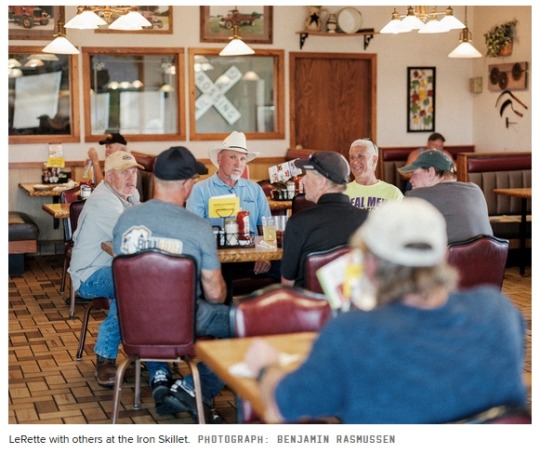
44 notes
·
View notes
Text
How Leaky Gut, Gary Snyder, Jim Harrison, and Okakura Kazuko Helped Me Rediscover Coffee.
Or, My Dad was a Zen Master, and I Didn’t Notice.

Zen is not some fancy, unique art of living. Our teaching is to live, always in reality, in its exact sense.
Shunryu Suzuki
It began simple enough, well, not that simple. The Traditional Chinese Physician diagnosed my partner with leaky gut syndrome. That sounds terrible, and it was for her. She loved boxed prepared foods and was not fond of vegetables. Time and malnutrition brought on by General Mills, Conagra, and a variety of corporate food chemists had caught up to her, killing the terrarium in her gut so that everything she ate penetrated past the lichen-like lining of her intestines and digestive tract so acid ate at the inner skin like a chemical spill eating the epoxy resin on a high school science class table. This acid wash triggered various autoimmune disorders and led to arthritis, diarrhea, malaise, and general misery for her and those around her. She spent a lot of time in the bathroom, travel was curtailed, and there was general unhappiness all around because the irritation in her gut often seeped out of her vocal cords.
The Physician approached me in the waiting room. At the same time, my partner lay in a private room with needles, restoring her chi into its proper channels and outlining the changes needed in our lifestyle to cure this plague of misery. The doctor told me I also needed to join the new dietary regime to be supportive.
“Well, OK,” I said with outward unfelt enthusiasm.
So we went home and cleaned cabinets, throwing packaged foods away and feeling pangs of guilt — should we throw it away or give it to a shelter? I had visions of homeless people excitedly getting free food that passed as quality and eventually needing a traditional Chinese physician to tell them why they had started crapping so much and with such urgency. I took it to the dumpster, deciding that if they dove for it, it would at least not be the typical garbage they found to eat there that already messed up their guts and energy meridians, contributing to a miserable lifestyle. Their choice would not be my responsibility. I am, after all, an American and well-practiced at ignoring or at least rationalizing my guilt at ecological and cultural destruction. The dumpster became my version of a clear-cut in Oregon. Behind twenty-five yards of pristine natural beauty and unseen from the speeding motorists on the interstates is a desolated waste that can only support the lifestyle of the rich and infamous. To paraphrase an adage from pop psychology, “What we don’t think about, we pretend we don’t bring about.”
And then there was the Mr. Coffee. It sat on the kitchen counter, a yellowing plastic oddly shaped box protectively embracing a clear glass carafe that produced without much effort or thought a dark brown nectar that started our day. It was simple: you pulled out the black plastic cup, lined it with bleached paper, measured several small scoops of coffee, replaced the black plastic cup, filled the box with water, hit the button, and left the room, knowing the watery brown liquor would be ready after the morning shower and shave. Frankly, I was addicted to the tasteless brown water that came out, full of caffeine that gave me a lift but no longer a sweet aroma, depth of flavor or anything but a buzz. The Physician said that they had to go. The little lichen and animal-like bacteria in the gut didn’t like the acid. She equated it with Agent Orange. Being of a certain age, I was more familiar with Agent Orange than I wanted or should be, and I suspect she knew that just by looking at my grey hair. She was playing dirty there, but “Well, OK.”
So Mr. Coffee went somewhere. I didn’t ask because I didn’t want to become like stomach acid and create more irritation. To ease the pain, I read an article by a Buddhist who said he quit coffee for six months and felt great but eventually had a cup of the dark roast at Starbucks. He didn’t get a buzz but got jazzed for two days. That didn’t help as I read his article while drinking weak green tea with ginger, waiting for caffeine-induced enlightenment.
As a caffeine junkie and failed Roshi, I needed some relief. Each morning, I scrolled Tumblr’s pictures while drinking my tea and tried to distract myself from the lack of coffee and junk food. Before I went to Tumblr and its processed version of the good life, I had returned to Zazen, you know, meditative sitting, but I was haunted by Buddhist demons carrying Starbucks cups. That was akin to the demons I had seen as a young college student Buddhist “wannabe” reading Alan Watts and D.T. Suzuki, practicing their version of sitting zazen. The forms Mara took in those sittings mostly looked like the red-headed girl I was dating. She would arise in my meditations dancing with her female roommate, both naked dakinis looking beguilingly at me, beckoning me. Needless to say, I never found a Bodhi tree as lovely as Keanu Reeves’ in Little Buddha. I usually went to the red-headed girl’s apartment, leaving my cat to fend for herself for several days. The cat was often irritated with me — the story of my life with females.
Giving up zazen for scrolling Tumblr didn’t help much. There were many beautiful images of landscapes, cityscapes, horses, wildlife, and old trucks and cars. It is a veritable Life magazine online, and being a trained art historian studying reproductions of pictures was right up my alley. There were many images of beguiling dakinis, but more provocatively undressed than those I showed freshmen when I taught art history. As an old man, experienced in the wiles of youthful Dakinis, they looked generally unbeguiling and un-tempting. Sometimes, they wore a plaid flannel shirt tied above the waist, standing next to a campfire, or sitting on the tailgate of a pickup, holding a tin cup of coffee; those got to me — I love plaid, and there was coffee. Even more painfully, there were camping pictures, not just any camping pictures but old percolators on campfires, some with steam coming out of their spouts, some with the cooked brown fluid being poured into cups. As I hit the little heart to acknowledge I liked those images, they appeared more and more frequently. I began to seriously think there were hells, Buddhists and otherwise, and real demons determined to steal my peace.
I was not always addicted to coffee. It all began next to the Seine at a little cafe on the Boulevard Saint-Germain, where I first tasted café au lait. I was a typical 18-year-old 1970s kid backpacking through Europe, and Paris was a first stop. I hated wine and was not too fond of beer, though I drank large quantities with friends at college my first term, and Perrier was breaking my travel budget. One day, I learned that café au lait was mostly milk, and being a farm boy still wedded to the idea that milk was good for me, I downed a cup of café au lait, then another and another. At the end of my first sitting, the waiter counted eight saucers and asked if “Monsieur was feeling okay.” “Sure,” I replied with composure I didn’t feel. I left the café, strolled down the Qui Voltaire, crossed the river on the Pont de la Concorde, hiked through the Tuileries and toured the entire Louvre in 45 minutes flat.
I continued my travels in Europe and tried every type of coffee I could find, settling on Turkish coffee in little cups with big cubes of sugar. In a pinch, I would accept espresso, but by the time I got to Italy, espresso seemed a weak way to live.
Then I returned to America, tried various diner coffees, and wondered why they served browned hot water. By then, Mr. Coffee had replaced percolators and any other form of making coffee all across America. Joe DiMaggio was happy and smiling on every new box containing a coffee maker and heading to an American home.
I tried to make Turkish coffee. Generally, I failed and finally settled on strong home-brewed Mr. Coffee with lots of heavy cream. I would occasionally daydream about camping with my parents and blue-speckled-ware coffee pots on the fire or the aroma of the coffee their electric percolator made as it rhythmically gurgled in the kitchen. It never occurred to me to get an electric percolator because they were, thanks to Mr. Coffee, passe and un-American. I also avoided percolator coffee because I associated it with the odor of my parent’s cigarettes. No matter how good the coffee smelled, I had an aversion to their cigarettes and my parents. Therapy helped me overcome my aversion to my parents but not cigarettes, and the association of stale, burned, chemical-treated tobacco and perked coffee remained.
I felt good after six months of a healthy life, eating right, losing weight, and spending less time on the toilet. I still, however, craved caffeine. I started looking at Mr. Coffee online and realized it was a version of pour-over coffee. So, I bought a plastic two-cup Merlita sit-on-the-cup pour-over device. It was an odd orange-pink affair, but It made a good single cup of coffee, and I discovered that the two-cup size worked just fine to make a single cup of coffee. I understood that a pour-over made better coffee than Mr. Coffee, even though the process was the same. The two-cup pour-over process did require me to pay attention to what I was doing.
This pour-over coffee period came while I re-read Gary Snyder and Jim Harrison, two old Buddhists who were even grouchier than me. They got me rethinking, too, about the practice of the wild and how aggravated I was with General Mills and Conagra and the whole mess of modern American consumerism I allowed myself to get sucked into. I realized I missed camping, hiking, and the smell of coffee perking on an open campfire. I truly missed robust campfire coffee with its flavor and aroma.
I bought an Italian Bialetti Moka pot to remain civilized about my need for aroma. ( I didn’t say I escaped consumerism, just I was aggravated with it.). As I entered the ritual each morning of making coffee in a Moka pot, so strong that I had to serve it in tiny espresso cups to keep the buzz low, I realized that making coffee was really about paying attention, like a Japanese tea ceremony. It took time and required focused measuring of the coffee, packing the funnel, preheating the water, a degree of zazen, listening for the gurgle of the pot and knowing when to take it off the heat so it did not get bitter. I liked the meditation of preparing it. I hated the tiny, over-caffeinated cups. ( My coffee fast had at least broken my addiction to triple-dose caffeine.)
Then we had a cold front, I mean a really cold front that made me wish I had remembered to close the windows the night before, and I had visions of camping, dakinis in plaid flannel shirts, me in plaid flannel shirts, lakes and campfires and a percolator on the fire. It was a memory of connection and loss rolled into one. I was young, and it was a time before Alan Watts and D.T. Suzuki when I knew how to sit, breathe, watch, observe, be present, and smell the coffee with childlike naturalness. So, back to the consumer websites. I scanned a couple dozen percolators. Being aware that I had to make sure I was not as irritating as stomach acid in my choice, I picked a shiny stainless steel eight-cup percolator over the twelve-cup spatterware blue of my encamped youth. Two days later, it arrived and posed gloriously on my stove. Even my partner admitted to its silvery beauty.
I then read internet manuals on how to make the perfect pot of percolator coffee. They all disagreed about the amount of coffee, timing, and type of coffee. Then I remembered my dad, carefully spooning a heaping tablespoon of coffee per 6-ounce cup of water and one for the pot. I remembered how, while he measured his coffee into the basket, the pot would sit on a rock on the fire’s edge and come to a boil. He would gently lower the full basket into the boiling water, place the lid on the pot and move the pot away from the heat, allowing it not to boil vigorously but return to a slow boil so the coffee would not become bitter. And then he would wait, light a cigarette when the water would start its gentle dance in the glass cap of the lid. While he waited, he watched the perking water in the glass knob at the top of the pot without fidgeting or seeming to allow his mind to race away with him. And at the end of his cigarette, after his short version of meditation, he would lift the pot from the fire, place it on another warm but not hot rock, wait again for the basket to finish draining into the pot and remove the basket so the coffee would not become bitter, pour his mug of coffee, and sit again. Still, this sitting involvedwatching the forest and just being. The memory reminded me of Okakura Kazuko’s “Book of Tea,” his extended essay about aesthetics, tea, and Japanese life. As I remembered my Dad by the campfire, I realized Mr. Coffee’s plastic convenience erased coffee’s aesthetic from American life.
I have discovered that Coffee is not just a daily punch line at Starbucks with crazy concoctions snatched by a string of crazier motorists, nor is it the caffeine jazz you get from a neglected Mr. Coffee after a shower and a shave. Making coffee is a meditation, an act of beauty, a reminder of history and a rare act of America behaving in a more civilized way. In the Book of Tea, Kazuko comments, “The Westerner regarded Japan as barbarous while she indulged in the gentle arts of peace and began to call her civilized only when she began to commit wholesale slaughter on the Manchurian battlefields.” I realized that Mr. Coffee not only made barbarous coffee (we won’t even discuss Keurig), but Mr. Coffee was part of our uncivilized behavior toward the entire world, eliminating a small act of spirituality from our racing over-wrought lives.
I now regard the loss of Mr. Coffee not as a loss. It is a spiritual gain. Each morning now, I conduct a ritual. I rinse all my utensils, fill the pot with eight six-ounce measures of clean water, eight heaping tablespoons of freshly ground coffee and one for the pot. I bring the water to a boil, carefully insert the coffee, and place the lid on the pot. I watch until the water rises into the glass knob and then sit, and breathe for eight minutes, the amount of time I think it would have taken Dad to smoke a cigarette. I remove the pot and sit long enough to allow the water to finish draining from the basket, remove the basket and pour coffee into a mug reserved just for coffee, the one with the horses standing in a stream, drinking clear water. And then slowly sip while I sit on my porch, looking at the mountains. When it is cool enough, I wear a plaid flannel shirt and remember a time in my youth watching my father, who had never heard of Alan Watts, D. T. Suzuki, or Zen, sit his version of Zazen drinking his coffee, smoking one of his ever-present cigarettes looking out over a campfire at the lake and being at peace and away from the “chaos of the rat race,” as he defined it.
Maybe being a Roshi is realizing that life itself is Zazen if you slow down and allow it to be. Today, I lifted my cup to a man who was my Roshi that I didn’t notice. I suspect we all have such untitled Zen teachers.
15 notes
·
View notes
Text
Eye Opening Concept of "The Great Dictator" And Chaplins Portrayl as one of the most Notorious Leaders
Dante Calabrese
This week, I saw the Charlie Chaplin film The Great Dictator, which has a lot of anti-Nazi overtones. It also relates to Dorothy B. Jones' book The Hollywood War Film: 1942–1944. In this passage, it is discussed how World War II-era movies portrayed the conflict and the issues they explored. Since not every nation participated in the war, the reading also touches on how the conflict has been misrepresented in movies.

There are numerous examples of anti-Nazi undertones in Charlie Chaplin's 1940 film The Great Dictator. Charlie Chaplin portrays two characters: Adenoid Hynkel, a mocking allusion to Adolf Hitler, and a Jewish barber. The story alternates between the lives of Hynkel and the Barber giving off a two story plot connected into one entire story alone. In the text of the book a quote by Jones, she states “During 1942 and 1943 the quality of home-front stories was consistently low. In most films, such activities were given a comedy treatment.” Another ideal quote from the text emphasising the connection with the film plot very well is “As a whole, they tended to stereotype them as the usual gangster “heavy,” identifiable by the fact that he either “heils Hitler” and speaks with a guttural German accent, or has slant eyes and hisses his “s’s””. Its very intersting the how this quote shows great emphasis and description of how Chaplin's acting and the other supporting cast portray these Nazis acting in the film. What this film does at the end of the day when taking in all of it is that a famous actor Chaplin himself took his artistic skills of turning one of the most horrible and dealiest Genocides by making it into a dark humor comedy as a means to help people digest this horrific realife events but at the same time spinning it into a new twist that the Holocaust had to endure, almost a means of coping with this. While excellent in the role, Chaplin also adds his own brand of humor by essentially making fun of himself. He conveys the idea that the guy he is playing, who is perceived by the Germans to be an all-powerful and idolized person, is actually just a horrible and stupid person by using his facial expressions and even stumbling over his sentences. He takes the oppertunity to mock humiliate Hitler and showing him as fool. Lastly Ironically history would repeat itself with the hollywood film industry with another film taking the same extent of comdey and foolishnes making fun of Hitler was the 2019 film, "JoJo Rabbit" with the director taking on the same role as Chaplin did being Hitler. The story follows as so, Jojo is a lonely German boy who discovers that his single mother is hiding a Jewish girl in their attic. Aided only by his imaginary friend -- Adolf Hitler Jojo must confront his blind nationalism as World War II continues to rage on.
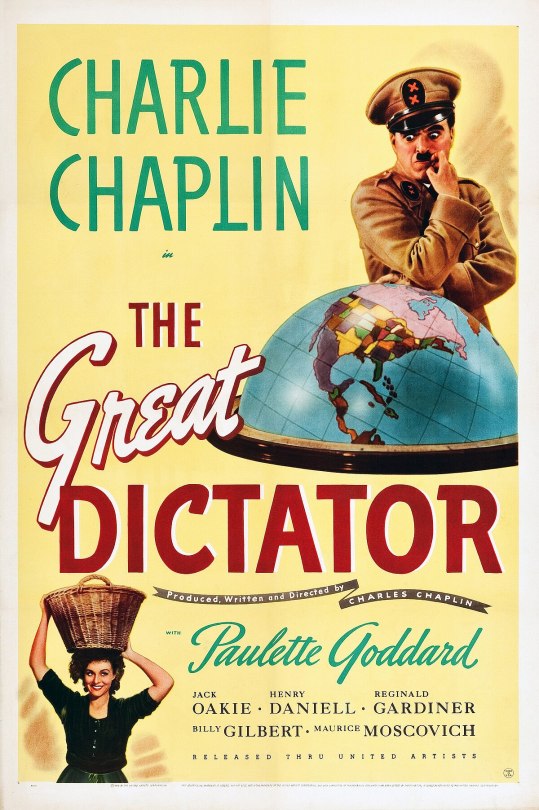
Reference
Jones, Dorothy B. “The Hollywood War Film: 1942-1944.” University of California Press, University of California Press, 1 Oct. 1945, online.ucpress.edu/fq/article-abstract/1/1/1/37212/The-Hollywood-War-Film-1942-1944?redirectedFrom=fulltext.
3 notes
·
View notes
Text
Shadow and Veil-Chapter Four

Summary: Eva Moore’s life was a carefully constructed fiction. Every day, she did exactly what her mother in law, her husband, and his best friend expected of her. No mistakes. And, that was going pretty well for Eva right up until a huge complication literally tried to run her over. Now, she’s faced with trying to keep the pieces of her life from falling apart while attempting (and failing) to keep her feelings for her husband’s new business partner at bay.
A/N: This fic is a sister-fic to A Need So Great and A Need Unleashed. You do not need to have read ANSG or ANU to read this fic, but there are Easter eggs from those fics in Shadow and Veil for readers with keen eyes. This fic is explicit for canon-compliant blood, gore, violence, and sex. As such, it is intended for an adult audience, only. A/B/O dynamics come with their own warning. Anyone under the age of 18 should not interact with this work. I do not consent to reposting this work to other platforms. Reblog only to Tumblr.
Word Count: ~3600
Start from the beginning Previous Chapter Next Chapter
Masterlist Read on AO3
The SUV was cruising at speed down the interstate. It wouldn’t be long before the city fell away and everything around them would be either farmland or swamp. Eva sat in the back seat, staring out the window. Alexei was driving with one hand on the wheel and the other supporting his weight on the middle console. Josh was directly ahead of her. They were all listening to a local music station that occasionally cut out with dry static.
She was bored. Had been since they left the house. Neither Alexei nor Josh were saying anything to her and she didn’t know why they invited her along.
The destination—the lab—was remote, far away from Ardent Pharmaceuticals’ corporate offices. On paper, the building was mostly storage. And, from the outside looking in, that’s exactly what it was. Most people wouldn’t even notice the trap door to the right of the entrance. The stairs beneath led down to a smaller room with all of the most up to date technology for chemical engineering.
It was here that Josh’s real passion in life took place.
Eva might be good at math, but Josh was an absolute genius when it came to pharmaceutical innovation. All of his wealth stemmed from improving drugs that were popular with his clients, skimming past FDA approval by selling them under the table to every doctor and pharmacist in the surrounding area under the guise of ‘samples’. What most of their customer base didn’t know was that Josh’s improvements made what they thought was a standard formula pill into something more addictive with a high that couldn’t be matched by other brands.
It wasn’t as clean an operation as Eva liked. There were plenty of things that could get them caught and this new expansion was definitely one of them. Their distributor for the raw materials was consistent and she hadn’t noticed any shortages as of late. They didn’t need another resource for getting the raw chemicals needed to make Josh’s ‘special blend’. It made Josh’s decision to add another business partner into the mix that much more suspect.
She hadn’t seen him since that disastrous meeting, but every once in a while she would catch his scent as it faded from a room he’d been in. Eva took those opportunities to breathe deeply in an attempt to immunize herself against the feelings that scent evoked. She hoped that their next meeting would go better than the last, that her body wouldn’t betray her again.
Alexei made the turn onto the unnamed road leading to the lab with the comfort of someone who had made that turn over and over. The building rose up into view, looming darkly on the horizon. Eva watched it grow until Alexei pulled the car to a stop in the small parking lot.
Josh got out of the SUV and headed for the door, his keys jingling in his hand. Alexei cut the engine and followed wordlessly. Eva sighed as she opened the door and stepped out, as well. As she shut the door behind her, Eva was glad that she chose flats for the day instead of a pair of heels. There was no telling how long Josh would tinker around in his personal lab and places to sit were few and far between.
Eva was halfway to the door when the sound of tires rolling over asphalt got her attention. She turned and shielded her eyes with her hand as she peered out towards the main road. A sleek, black car hurtled towards them at a speed that was dangerously fast. It swung around in the parking lot, stopping cross ways over three spots not far from the SUV.
Who the fuck parks like that?
From behind her, Alexei approached. Towering over her, he followed Eva’s gaze as two people stood from the car.
“I thought they would have more trouble finding the place,” he murmured.
She almost asked him who they were, but her eyes adjusted to the distance and she no longer had to ask. Mr. Jimenez was sauntering towards them in a leather jacket, black t shirt and flared jeans. His booted feet took their time about crossing the lot, as if he had nowhere else to be.
Behind him, another man was following. He swiped at his mustache, fingers catching a cigarette and flicking it away. A plume of smoke wafted from a mouth that was set into a thin line.
Eva realized that she was staring and dropped her gaze. Blinking rapidly, she turned and went inside. They weren’t here for her, anyway. Glad for the air conditioning that kept their excess raw chemicals stable, she moved to stand a little ways away from the door to the basement. It was open, Josh waiting for no one to get to work.
Alexei’s body darkened the doorway. Their guests followed. None of them spared her a glance before they descended into Josh’s lab. Eva held her breath all the same. When they were gone, she let it out in a loud huff. She could not believe she was still attracted to him when he was dressed like such an asshole.
Now she understood why Bobbi Lynn’s husband referred to him as ‘new money’. Every piece of clothing on his body was designer, probably down to his socks. Add to it the obviously massive ego he carried in every step he took and Mr. Jimenez looked nothing short of gauche.
Underneath the clothes and the attitude and the way he looked down his nose at people was a man that Eva found wholly enthralling. The feeling made her hands clench with the need to curl into his hair. It made her mouth want to purse for a kiss.
Which was fucking ridiculous.
She was an adult. A married woman.
Maybe she got a bad batch from Bobbi Lynn—no, this started before she started taking the newer pills. Maybe she was sick. But, she didn’t feel sick. If anything, Eva felt entirely too healthy. Her body felt stronger. For the first time since she left her childhood home, she slept through the night without waking. Rose from her bed without the hangover of a restless night. Her mind was sharper, moved through decisions and equations effortlessly. And, more than anything, Eva was aware of her surroundings.
It was as if she put on glasses for the first time and the whole world suddenly came into focus. For years, she passed through life barely taking note of anything that wasn’t directly related to her survival. Now, she was doing things like lingering in the shower to feel the heat of the water. Or, putting on music while she cleaned. Just that morning, she actually leaned forward and smell the bouquet of flowers on the dining room table.
Fucking. Ridiculous.
“Eva!”
Josh’s voice startled her from the way she was pacing back and forth in thought. She gasped audibly, body freezing like she’d just been caught doing something she shouldn’t. Thankfully, Josh wasn’t climbing the stairs to look for her—probably too afraid Mr. Jimenez and his friend would touch one of his precious experiments.
“Eva!” he called again, this time with a touch of impatience.
Steeling herself, she hustled to the door and dropped down onto the stairs. Eva measured her step and let her mouth fall into a pleasant smile as she reached the landing. Folding her hands in front of her, she waited for his orders.
“Mr. Jimenez is making a delivery here in about half and hour,” Josh announced. “He’s brought us a sample to test as a matter of courtesy.”
She refused to look at him, but Eva could feel eyes on her. The room was small, much smaller than the warehouse above. There were two lab tables with various supplies on them sitting on either side of the room. Between the tables stood four men, none of which she trusted.
“I’d like you to do the honors,” Josh prompted, holding up a vial.
In it was a clear liquid that could have been water if it weren’t so thick. Josh held it out to her in offering.
One of the first things Josh allowed her to learn after taking the lead with their books was how to determine the purity of their raw materials. He drilled her over and over, applied pressure with a stopwatch and insults. Eva got it, though, could do it even in her sleep—as proven when he woke her at 2 am, dragged her to the kitchen and made her work in her nightdress.
Eva took the vial from him and pulled on a pair of latex gloves from where they sat on the table. Then, as she practiced, she measured out some of the unknown liquid into a test tube and began to run it through the process.
From her left, the man she didn’t know said something in Spanish. Mr. Jimenez replied, likewise. She guessed that English might be his second language, but hearing him speak in his native tongue made her hands shake. The glass of the tube clinked against a beaker of distilled water. She paused, and forced herself to reset.
All her practice with his scent was clearly not enough. It curled in her nose, nestled in the part of her brain that was tied to sex. In a stunning turn of irony, it occurred to her that she should feel grateful for the way she couldn’t get a handle on her hormones around him. Eva had never enjoyed sex with Josh and never once thought about striking up an affair in order to fulfill the need. All this time, Eva just thought she didn’t have a sex drive.
She was almost happy that she was wrong.
It coiled in her belly, this feeling. Warm and all too pleasant. Every shallow breath brought more heat, more...more. ‘More’ was the only word she could use to describe it. And, ‘more’ was what Eva wanted.
She wished that she could blame it on her status. Poor little omega can’t control her hormones around an alpha. It would be so much easier if that was the case. But, there were no shortages of alphas in Josh’s circle. Hell, Alexei was an alpha. Not a one of them had ever turned her head like the man watching her from his post near the stairs.
He was giving her space, she realized suddenly.
When she entered the basement, Mr. Jimenez was standing next to Josh. Eva’s husband hadn’t moved, was still looking over her shoulder from about three feet away. At some point while she was mixing chemicals at the table, Mr. Jimenez moved as far away as he could while remaining in the room.
Bless him.
Having finished her work, Eva capped the vial and handed it back to Josh, “Its pure enough to work with.”
Josh smiled. An outsider might think he was proud of her. Eva knew better. Josh was proud of himself. He’d found the new resource, he’d vetted them, and it worked out in his favor. Points for Josh.
Turning from Eva, Josh spoke to their new partners, “Looks like we have a deal.”
On cue came the sound of a truck rumbling to a stop in the parking lot. Mr. Jimenez glanced up, smirked, then climbed the stairs. Eva let the men go before her, taking her time getting to the top.
It took an hour to unload the delivery, another twenty minutes for Alexei to ensure that they got the full amount, followed by another five for Josh to quit staring at it. Eva supposed she should have been jealous. He rarely looked at her for half as long and never with that amount of intensity.
Her gaze flicked involuntarily to Mr. Jimenez and she was surprised to find him looking back. His expression was unguarded, the same as it had been on the sidewalk. She found herself caught in it, a heat creeping up her neck. Two, maybe three, seconds passed before he looked away and that stupid little smirk returned.
“Now that business is done, we will celebrate!”
Eva’s brows lifted as she looked to Josh for his response. Her husband tore his attention away from their new stock and fixed Mr. Jimenez with a smile, “Of course. I know just the place.”
She squinted at the back of Josh’s head as she followed him out to the car. Josh regularly went out with his partners, but most of them were fellow businessmen with good standing in the community. Their new partner was a stranger to their town, an unknown. Someone was going to notice that Josh was spending time with him and there would be questions.
Eva was going to say fuck all about it. She knew better than to contradict her husband in public. Or in private, for that matter. Keeping her head down, she walked right to the car, got inside, and waited for Alexei and Josh to join her.
When they did, Alexei looked at Josh and said, “What the fuck are you doing?”
Josh was all surprise, “What?”
Running a hand down his face, Alexei visibly calmed himself, “There is no reason we should be having drinks with that man.”
“Oh, please,” Josh drawled, “Its just a little get-together after a deal that went well.”
Alexei turned over the engine, “I don’t trust him. He’s shifty.”
“He’s Mexican,” Josh replied, “that’s how they all are. Besides, he’s got connections. Connections that we need.”
Eva stared at the backs of their heads, wondering what the fuck was going on. What didn’t she know about Mr. Jimenez that would make Josh so careless with his reputation?
“We can get it elsewhere,” Alexei said, with feeling.
Josh waved a hand, “I’m not paying the shipping all the way from Europe when I can get it right here in North America.”
Turning her attention to the window, Eva pretended not to listen. All the while, she wondered what it was that Josh was so intent on getting. They had plenty of money, if he needed it. Paying additional for shipping shouldn’t be a barrier.
“You don’t know that he’ll come through with those connections,” Alexei replied lowly.
Again, Josh dismissed his friend, “I had him checked out.”
“So did I,” Alexei retorted, heat in his tone, “The man didn’t exist before five years ago. His records just,” he flexed his hand between them, “poof...disappear.”
Eva held her breath, waiting for Josh to say something. The silence between the two men stretched on and on until she figured the conversation wasn’t going any further. The SUV carried them back into the city and down familiar streets to a jazz club that Josh was fond of. Alexei parked, but didn’t get out of the car.
“I’ll wait here.”
Josh sighed, “Don’t be like that. We’ve had a good day.”
Alexei remained stubbornly silent and Eva knew there would be no budging. She slid from the back seat and closed the door, waiting for Josh to move towards the entrance. He stared at his friend for long seconds, his brows drawn together. Then, with his lip curled, he slammed the door shut and spun on his heel.
The ire in his expression slipped away as Mr. Jimenez met them at the door. Eva kept her distance, saying nothing and drawing as little attention to herself as she could. She probably shouldn’t have bothered. Josh was in a gregarious mood, telling jokes and all of his little charming anecdotes that he used to endear himself to the people around him.
Mr. Jimenez smiled and laughed at all the appropriate times, drank the liquor he was given, remarked on the music and the other patrons. His friend, Javier, was more reserved, but no less engaged with her husband.
Eva was using almost all of her focus to keep her breathing even and her ass in the seat. Sipping the white wine Josh ordered for her was absolutely not helping her to relax. The muscles in her thighs shook beneath the table from where she was pressing her legs together. Heat settled low in her belly. Sweat beaded at her hairline.
Even over the other scents in the room—liquor, smoke, salt—she could smell him. Tobacco and vetiver. The cologne he favored had worn off, leaving behind a scent that was all delicious alpha.
Josh laughed loudly, breaking her away from the day dream of pressing her face into the gland behind his ear. Embarrassed, she drained her wine glass and looked around the room for something to focus on.
A waitress approached and leaned down to speak with Josh, “Sir, there is a call for you at the manager’s desk.”
For the first time in years, Eva wished to God that Josh would stay by her side. He didn’t. Rising, he told the table he would be back shortly and strolled away with the waitress in the lead. To Eva’s utter dismay, Javier muttered something about finding another pack of smokes and left the table, too.
And then they were alone—or, as alone as anyone could be in a room full of people.
She kept her eyes on the tablecloth, counted the threads and thinking that she might benefit from another glass of wine.
“So, you’re called Eva.”
Glancing up was a reflex. Having already begun to look at his face, Eva could not tear her eyes away from him. The mask of arrogance he wore like a second skin once again dissolved away.
“And, you’re called Mr. Jimenez.”
She wouldn’t allow herself to call him by his first name. That kind of familiarity would only lead to disaster. Better to keep him at a distance.
He flinched. Eva clenched her jaw to keep from apologizing for the sarcasm in her tone. She didn’t owe it to him.
Sipping from his glass, he ticked his head to the side, “I’m not going to tell him.”
The heat in her body cooled to razor sharp fear. Quickly, she calculated how much he would have been able to deduce from their limited interactions. Eventually, she concluded that he might know enough to make her life difficult, but it would be a small matter of telling Josh what he wanted to hear to assuage whatever hurt he might be feeling.
“There’s nothing to tell,” Eva replied carefully.
One side of his mouth lifted in a very different kind of smirk than he’d used before, “Of course not.” Then, “How long have you been married?”
Eva shrugged, “A little under seven years.”
His gaze turned assessing, “You’re very young to be married so long.”
She scoffed, “If I weren’t married by my age I’d be considered a spinster, Mr. Jimenez.”
Again, he flinched.
“And you?” Eva asked, her tone polite, “Is there a Mrs. Jimenez I should include in my invites to the ladies’ luncheon?”
She didn’t want to think about why she was asking this question—mostly because the reason was clear as day.
He shook his head, “No, I’m not married.”
To cover her own relief, Eva flagged down a waitress and asked for another glass of wine. When she turned her attention across the table again, Mr. Jimenez was openly staring at her. The air in her lungs got stuck in her windpipe under the intensity of his gaze.
The heat being directed at her felt like it might singe her skin. She took it in, meeting his stare with one of her own. Eva had never been so bold in her entire life and likely never would be again. She might as well enjoy it while she could.
In her periphery, Josh moved through the crowd. Quickly, she dropped her gaze to the tablecloth and tried to relax. He sat with a loud sigh, setting down the glasses he carried in each hand.
“Work never stops,” Josh announced, “Where’s your partner?”
Mr. Jimenez shrugged, “Getting cigarettes, I think. Or, he’s looking for a woman to take home.”
“Ah,” Josh breathed, “I remember those days. They’re all behind me now.” He put his arm around Eva’s shoulders, “Got the old ball and chain to weigh me down.”
Brows lifting, Mr. Jimenez replied, “You told me, yourself, that she does a remarkable job with your books. Where I come from, that’s an asset you don’t take lightly.”
Her husband was either too drunk or in too good a mood to notice the censure in Mr. Jimenez’s voice. Eva couldn’t so easily dismiss it. Two compliments. Both given with what appeared to be sincerity. And, in front of other people. It made her want to know what he would say to her in private.
They didn’t stay much longer after that. Josh had work in the morning and he didn’t like to miss his early appointments. Mr. Jimenez said his goodbyes and drove away with what seemed like little care for the fact that his partner hadn’t returned. Josh ignored the way Alexei stared him down as he headed for the car.
Eva, for her part, got in the car and leaned back in the seat with her eyes closed. The whole way home, she memorized the warmth in Mr. Jimenez’s eyes as he spoke with her. It was so different than the cool indifference he cloaked himself with in every other interaction. She didn’t like how intrigued she was by him. Didn’t like that she wanted to dig underneath his skin to find out who he really was.
After they parked in the driveway, Eva stepped out of the car and walked into the house. By the time she got to her bedroom, Eva made the decision that she shouldn’t talk with him anymore. By the time she lay her head on her pillow, she changed her mind.
7 notes
·
View notes
Text
Surprise!
“Come on y/n.. Everyone is going to be there. Including your old crush.” Your face turned red “I don’t know, won’t it be all heroes?” Toga smiled “So?” It’s not like they know you, and I can disguise myself.” You sighed. “What’s wrong y/n. I think crashing a hero party sounds like a great idea!” “You turned to see Dabi standing beside Toga. You roll your eyes, “we’re not crashing a party.” Toga echoed in laughter “Fine we won’t crash it, but let’s just check it out.
As the three of you walked up the shore front, you could see heroes everywhere throughout the beach shore and house. Everyone was there, Red Riot, Chargebolt, Deku, All Might, Shoto, Uravity, Hawks, Aizawa, and so many other. Glares were exchanged as you made your way down to the beach. Toga had changed her look to a random citizen but everyone knew Dabi’s look and it wasn’t like he was shy. “What are you doing here?” You turned around to see Shoto. You opened your mouth to speak “What’s wrong baby brother, don’t like the idea of big bro coming to say hi.” You elbowed Dabi “You said we weren’t crashing!” He smiled “No, Toga said we weren’t crashing.” You glared at him in frustration. “Leave now, all of you.” Your face turned crimson as the embarrassment set in. You grabbed Toga and Dabi and began directing them away from the party. “I told you this was a bad idea.” You walked down the beach to an empty area a ways away from the party, you could still hear the music and see the flicker of the fire on the beach but that was it. Toga and Dabi decided to head back home to start their next heist planning but you wanted to hang out on the beach for a bit. It was a nice night and the stars were gorgeous. “You look lonely?” You heard a chuckle from above where you were laying. “Just enjoying the night.” The man sat down next to you “I’m sorry they kicked you out with the other guys, just cause you don’t have a quirk doesn’t mean you’re a villain.” You paused for a moment “How do you know I don’t have a quirk?” The man laughed “Cause you didn’t pose a threat which either meant you were quirkless or harmless.” You sat up and looked over “You’re Deku right?” Deku giggled “Yeah, I wanted to see if you wanted to come back to the party, I think you’ll get along with alot of us.” You smiled “Thanks, but I prefer not to be a party crasher.” Deku laughed and stood up holding out his hand “Come on, you’ll be fine if I take you.”
As Deku and you made it back to the party, a couple heroes glared but most of them looked more surprised “Deku? Why is she back here? I thought she was with Dabi and his girlfriend.” Deku tightened his grip on your hand “She didn’t go to U.A. cause I believe she’s quirkless, so she wasn’t introduced to any of us for her to have a chance at being friends with us. So Uraraka I think we should give her a fair chance. She’s met the villains and they accepted her, why can’t you do the same?” Uraraka’s face turned red and you could see her anger and jealousy grow. Deku looked at you “So are you quirkless?” You shook your head and whispered “No, I can hear what they are thinking. Uraraka thinks I’m deceiving you and that you're being naive. Shoto doesn’t trust me because I came here with his brother Dabi, and Dabi is never up to anything good, so he thinks I was sent here by Dabi. Hawks is open minded but watching me. His exact words were “Not everyone who associates themselves with Dabi is bad, look at twice, he wasn’t a bad guy, he just trusted bad people.” Deku smiled “So you aren’t quirkless?” You smiled “I just don’t have a support quirk or a hero quirk, so I was better off being in just normal school with quirkless people.” Deku smiled “But you could hear everyone’s thoughts? Wouldn’t that be loud?” You smiled “No, it isn’t like I just hear random voices, I have to focus on that person, then I can hear what they are thinking. Like you “You’ve been thinking that I remind you of when you were quirkless. But you’re intersted-” Deku shifted “Bakugou! I was wondering when you were gonna appear.” Bakugou looked down noticing you avoiding eye contact “Who’s the shrimp?” Your face reddened “My name is y/n” Bakugou chuckled “Oh, I don’t remember you from U.A..” Deku glared at Bakugou “That’s cause she doesn’t have a quirk so she didn’t attend U.A.” A smile crept across Bakugou’s face “Aww so you’re quirkless.” You looked up at Bakugou’s ruby eyes and were ambushed by his melted caramel scent. “She’s cute, it’s no wonder why Dabi kept her close over the years.” You giggled as you looked away from Bakugou “What? Did I say something funny?” You shook your head no as Deku leaned down “You shouldn’t read his mind without him knowing, he’s a touchy temper.” You smiled “He thinks I’m cute...” Deku chuckled “What’s so funny Izuku?” Deku smiled “Nothing, she was just saying how she’d like to get to know you so if you wanna show her around.” You glared at Deku “Are you kidding me!” Deku didn’t need to use his voice, you could hear his thoughts loud and clear “Oh stop, you’ll have plenty of fun, plus I seen how you looked at him when you first seen him.. I’m not stupid.” Bakugou held his hand out for you to take “I’ll show you where the bathroom is and where you can grab a drink if you want one.” You placed your hand in his and nodded “OK..”
As Bakugou led you through the house, you could hear thoughts flood in as your eyes sifted through the glares. “Who is she?” And “why is she with Bakugou?” You looked at the floor to collect yourself from the judgement. A warm callused hand touched your face as you heard Bakugou say “Their glares are meaningless, just ignore them. It’s my party and I want you here so.” You look at Bakugou as his beautiful ruby eyes stare into your eyes. “Fuck, I sound like a complete dumbass. Well no chance in seeing her again after this shit party.” You smiled as you broke eyes contact “It’s not a shit party and you’re not a dumbass.” Bakugou tilted his head in confusion “how did you know that? You aren’t quirkless are you?” Your face reddened as you pulled your hand from his. He set off a small explosion in his hand which immediately shifted your attention back to him. He stared at you with silence using his thoughts to speak for him “you can hear me this way cant you?” You nodded “Yes..I-” Bakugou grabbed your hand and directed you through the house and back out to the beach front. “Bakugou where are we going?” Bakugou smiled “I wanna know more.” As the two of you made it down to the water away from the party, he stood only inches from your face. “Does Deku know?” “Yes” “What about the villains?” “Some of them.” Bakugou feel silent almost like he was looking for his next question as he stared out in to the open ocean. Your eyes scanned across the water before making their way back to Bakugou who sat in silence.. yet his mind wasn’t anywhere near quiet. “Has she always been this beautiful?” I don’t understand if she had a quirk, she should of been able to get into the university. would she reject me if I tried to kiss her?” Bakugou shifted his attention back to you as you looked back to the ocean trying not to show that you heard everything. “Uh, how much of that did you hear?” You laughed nervously “uh- hear what? I didn’t hear anything.” Bakugou laughed “Oh, yeah? So if I just happened to grab here” Bakugou placed his hand on your waist and pulled you towards him. “And my other hand here” His callused warm hand grazed your cheek. “And I don’t know, did this.” Bakugou’s warm soft lips pressed against yours as a buzzing sensation was sent through your body. You melted in his grasp as he pulled away just enough to speak “You didn’t know that I wanted to do that?” You giggled throwing your arms around his neck “Nope” Bakugou chuckled as he pulled you tight to his body. Your tongue grazed his bottom lip and he was more them happy to let his dance with yours. You pulled away smiling. Bakugou smirked “So does your quirk work on it’s own or do you have to use it.” You looked away “If I focus on someone too long, it does it on it’s own. I usually ignore them.” Bakugou lets you go and sat on the beach sand. As you look down he put his hand out “Come here” You smiled and took his hand as he directed you to sit on his lap. As you sat down and you boobs met his face, he pulled you into him smothering his face into your beautifully bouncy breast. Bakugou let out a loud exhale as you looked down at him “I could definitely do this everyday.” You let out a giggle as you rested your cheek on the top of his head. He pulled away “It’s not nice to listen to my thoughts when I’m not aware of it.” You giggled “Sorry but I like knowing what your mind thinks of me.” Bakugou pulled back “Then just ask. I think your sexy as fuck and beautiful and I wanna-” “Hey, Bakubro- Oh sorry, we wanted to make sure-” Bakugou lifted you off his lap and put you next to him “What the hell shitty hair? Really you brought the entire class 1-A?” Deku stepped forward “I tried to tell them I didn’t sense a threat from her so there was no reason to worry.” You stood up and walked towards the water. “Hey? where-” Deku yelled after you. You turned around “It seems like I’m unwanted here, so I’ll take my lea-” A loud explosion went off “The fuck you will! Look guys I appreciate your concern, but I think I can handle a shrimp like her.” Shoto went to speak as Hawks dropped in “Shoto, I understand your concern but not every one who associates themselves with Dabi is bad. I think you should give... Where’d she go?” Bakugou turned around to find you no where to be found.” Bakugou turned towards everyone “Damn it!” Deku walked towards the water “She was just there, she couldn’t of gotten far.” Uraraka growled “See I told you, she shouldn’t be-” Deku turned around “Leave!” Uraraka’s face turned red. “Deku, I think she-” “Mina don’t or you can leave too.” Mina grew flustered as she walked towards Uraraka “Why are you protecting her so much! Why do you care?” Deku turned around furious as he walked towards the water “Because I know what it’s like to want to be accepted and want to fit in! I know what it’s like to be the outsider! To be the one who’s quirkless! NOW LEAVE BOTH OF YOU! Mina and Uraraka walked back towards the house “Anyone else who doesn’t wanna take Bakugou’s feelings into consideration about y/n can leave as well. Shoto, Kirishima, Denki?” Bakugou looked at Deku “Thanks..” Kirishima shook his head, “No, if Bakugou trusts her, I trust him.” Iida, shoto, and denki nodded agreeing with Kirishima. “Then lets find her.”
As you swam out as far as your body could take you, you floated staring at the star. “Y/N!!” You could hear a faint voice yelling for you. “Y/N!!” A few different voices. The water grew cold and you were losing feeling to your feet, you were also growing tired. “I just wanna sleep.” Y/N! she cant be out here much longer the water will get too cold, icy hot, you think you can heat-” “Not without knowing the direction she’s in. It would take too long to heat the entire area.” “DAMN IT!” Bakugou set of multiple explosions sending him into the air as he scanned for you.” The water grew colder as you became more tired. “Stay awake.” You felt your body begin to slow down and stop responding. “There you are.” You feel warm hands touch your body, but can’t see who it was. Then you hear a familiar giggle. “Toga?” Toga smiles “out to be drowned today are we?” Shoto noticed a bright blue flame down the beach in the water walking towards the shore. “Bakugou!” Bakugou turned towards the direction shoto was pointing “No... they came back for her..” Kirishima turned towards Deku “You think she’s gonna go with them?” Deku nodded “By this time with how cold the water is, she’s probably going in and out of consciousness, so yes. I think they will take her and even if she is slightly conscious, they accepted her, and didn’t doubt her. So yes, I think we’re about to lose her.” Bakugou growled “Not if I have something to say about it!” Deku grabbed Bakugou’s arm “Don’t, it’ll start a war and she needs medical attention soon. She won’t make it if we fight them now. Let them take her for now, get the help she needs, we’ll follow her, and wait and that’s if she doesn't come find you first.” A truck pulled up next to the blue flame on the beach and Bakugou watched as they put you in the back with Dabi and Toga climbed in the front seat. “Where Katsuki?” Dabi echoed in amusement “Back at the beach, we have to get you back to the house. Toga has blood back at the house that is at a temp that will bring your body temp back. “You’re warm Dabi? His face reddened “Just do me a favor, dont die.. you’re useful.” You looked up at Dabi “Why do I give a shit.. Why did I get so worried when her tracker showed her heart rate dropping.. I’m not supposed to give a fuck, she’s supposed to be a tool.” You smile and turn your head as you drift off to sleep.

“Dabi. She’s stabilized and ok she just needs to rest.” Dabi smiled “Good then the plan is still in motion. Once she gets close to Bakugou, He will be be easy to crush.” Toga smiles walking up to Dabi “Your so smart Dabi!!” How’d you know he’d fall for her..” Dabi looked up at his hand as he mumbled “Cause if I fell for her, he will too.” Toga growled “Why do you like her so much “her quirk is useless, the only reason we recruited her was -” “Get off me Toga! My feelings for her as a person are irrelevant to this mission and you.” Toga dropped to the floor as Dabi shoved her off the edge of the couch.
You woke up and noticed a familiar smell “You looked over and there stood Hawks and Bakugou” You sat up urgently “What are you doing here?! You need to leave, I heard Dabi say they have a tracker on me, it gives my location and vitals, that’s how they knew I was in trouble.” Bakugou covered your mouth “SHHH! they don’t know were-” The door opened and Dabi let out a malicious laugh. “See I knew if we took her to an open location where you could find her, you’d come. And you’d be dumb enough to come, well almost alone.” “Bakugou, leave.” You stated trying to get up.” Hawks walked over and picked you up “Were leaving.” Dabi smiled “Yeah, I don’t think you are.” Bakugou stood between Hawks and Dabi “Well I do.” Bakugou let off multiple explosions forcing Dabi back as some of the ceiling came crashing down “Hawks go!” Hawks flew through the hole Bakugou created as you screamed trying to fight your way out of his grasp “Don’t leave him there, that was their plan the entire time, I heard them on the way home, they’re using me to-” “Stop y/n, I didn’t leave him, I’m simply passing you off and then we’ll go back. Iida and Shoto are about 3 miles the other away waiting for you and then Deku, myself and Aizawa are going back to help Bakugou. You sighed “Please bring him back in one piece.” Hawks smiled as he landed placing you on your feet “Iida take her back to U.A.. Have Recovery girl check over her.” Iida nodded as Shoto started the car “Please watch your head.” shoto smiled as he opened the car door. You sighed “ok.” “y/n” You turned around “He’ll meet you at UA before sunrise, I guarantee it.” You smiled at Deku as he and Hawks and Aizawa took off into the city
As you reached U.A., recovery girl met you at the door. “She looks like she has been treated fairly well.. wait? I thought you said you were bringing me a quirkless girl? She isn’t quirkless at all.” Shoto and Iida step back from you “You lied?” You sighed “No, I just don’t talk about my quirk, it’s rather useless.” Shoto looked at you “What is your quirk?” You sighed “I can hear what’s unspoken by the mouth yet spoken in the mind.” Iida smiled “You can hear our thoughts. That’s why you felt so uncomfortable at the party, even though we said nothing, you could hear it all.” You nodded “Yes. Deku and Bakugou were the only ones that didn’t want me to leave and that were willing to give me a chance. well Hawks too.” Recovery girl stepped forward “Either way, let me take you in and do a full evaluation.” “Can you remove the tracker they implanted in me?” Recovery girl smiled “Of course y/n.” The three of you made your way to a room and recovery girl checked you over. “She will be fine, her body temperature has already returned to average and there doesn’t seem to be any permanent damage. She should take it easy after removing the tracker my quirk helps speed up the healing process not heal it immediately” You sat up off the bed “Good then lets go help Bakugou, he doesn’t know what he’s up against. Dabi is out for blood and Bakugou-” The door open “Bakugou what?” Bakugou stood in the doorway smiling as blood ran down the side of his face. “Are you insane! Where’s Deku and Hawks and-” “We’re all fine, The rest of them stood in the hallway behind Bakugou. You jumped off the bed and ran to Deku “You’re ok!!” Deku laughed wrapping his arms around you. “I wasn’t expecting to get the first hug.” Aizawa and Hawks chuckled. Bakugou growled “What am I dog-” You let go of Deku and threw yourself into Bakugou pressing your lips against his stopping his statement midway. Bakugou’s face became reddened as he was caught off guard. Aizawa and everyone else bellowed in laughter at Bakugou as he wrapped his arms around you. As you pulled away and smiled you spoke softly “Now can we get those cuts looked at, I’m sure everyone has some we need to check out.”
15 notes
·
View notes
Text
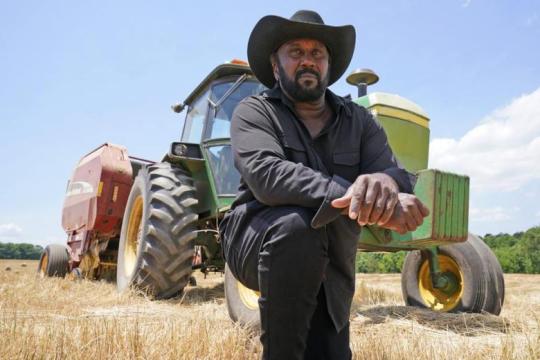
As the state of Tennessee uses eminent domain to take over land to connect a new multi-billon dollar Ford plant to the interstate, Black farmers say the government is offering them a fraction of what their land is worth.
A year ago, Ford Motor Company broke ground on a $5.6 billion electric truck plant in a rural region of Tennessee full of African American farmers, according to Tennessee Lookout. While the investment has brought economic prosperity to the area, Tennessee government officials have moved to threaten Black towns and financially bulldoze over land that has been in Black families for generations.
Now, the Tennessee Department of Transportation is attempting to use eminent domain to take over Black farmers’ land while offering them a fraction of what their land is worth.
“It’s not the first time we’ve had to fight,” Marvin Sanderlin, a longtime farmer in Haywood County with 400 acres of land told Tennessee Lookout.
The recent developments come a year after a Tennessee Comptroller told Black residents of Mason to remove their Black elected officials from office. It also comes during the fallout over Tennessee House Republicans expelling two members of the Tennessee Three after the lawmakers protested for gun safety legislation on the House floor.
Black farmers fight for fair deal in state land grab
Marvin Sanderlin is no stranger to fighting against the state to maintain ownership of his land. Local accounts highlight how his great-great grandmother, an enslaved woman, successfully sued to ensure her children inherited a portion of land from their slave-owning father.
The state has taken Sanderlin to court for 10 acres of his property as it lies in the path of the planned roadway that would connect the Ford plant to the interstate.
Sanderlin says the state is offering him only $3,750 per acre.
“That’s unheard of,” Sanderlin said. “You can’t buy no land here for $3,500 an acre. You can’t buy a swamp here for $3,500” Sanderlin said. “I told them this is the biggest ripoff there is. They want your land, but they don’t want you to participate in the wealth.”
The proposed construction would run through Black-owned land in Tipton, Haywood and Fayette Counties.
Some Black farmers and land owners have joined together and, along with the NAACP, plan to fight back.
The fight comes as Black farmers around the nation continue to criticize the Biden Administration for its failure to secure targeted investment for them in the federal farm bill, despite Black farmers suffering long-time discrimination in federal funding.
Investment on the backs of Black farmers?
The Ford plant is expected to add 6,000 direct jobs and nearly 25,000 indirect jobs to the region.
“With the single largest investment in state history, this historic project brings thousands of jobs and new opportunities for Tennessee families to thrive,” Gov. Bill Lee said last month.
Yet Black farmers who own land along the proposed roadway’s path say the economic prosperity arriving in the region shouldn’t come at the cost of their land.
Ray Jones is a retired school teacher who runs the Boys and Girls Club of Brownsville. The state is offering him just over $8,000 for an acre of his land.
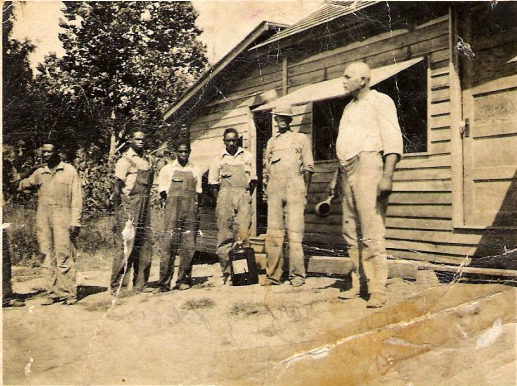
Jones said he supports the Ford investment, but he blames TDOT for their attempt to hustle him off his land.
“All the people are benefiting from BlueOval and that’s good. We are 100% in support of BlueOval. Make sure you quote me on that. But then you want to take my spring and give me pennies on it? It’s an unreasonable situation,” Jones said.
Rosa Whitmore, 82, owns a home that was built on land where her grandparents picked cotton. She says the state didn’t inform her of their interest in her land until late last month. They’re also offering her just $8,000 per acre.
“I worked with my own two hands up at 6 a.m. going to work in the field under the hot sun. That’s what we had to do to own this land,” Whitmore said.
#Black Farmers#Tennessee#white supremacy#white racism#Black Farms Matter#Black farmers say Tennessee trying to hustle them off their land#FDA#Dept of Agriculture#imminent domain#land theft#ford motor company#blueoval#Share Croppers#Reparations
2 notes
·
View notes
Note
Husband and I rode an Amtrak train in Texas. We had our own private seating area and they served meals. I don’t know how much it was (he did it as a surprise because our original New Years Day plans fell through) but it sounds like the further you ride out the cheaper the ride. For my birthday we rode on a historic train near Austin called the Hill Country Flyer, got to walk between the cars and at one point they opened some of the windows and it felt like being in one of those old romantic movies. I wish they were more accessible, but trains are definitely still around.
Ex girlfriend of mine did the train up to Portland to visit her grandparents at one point while we were dating, had a wonderful time on it group in the dining car got her a couple of "beverages" even though she was under 21 at the time.
Trip took a fair deal longer than driving, just because of all the stops but if you're heading off somewhere and not worrying about driving when you're there nice to be able to arrive not tired and stinky from the road.
US really did drop the ball when it came to infrastructure as it relates to rail service, if it had been given more consideration during the westward push, post civil war reconstruction, the new deal, or even done concurrently with the Eisenhower interstate run we'd be in a better position to increase capacity, speed, and destinations.
But westward push they were more concerned with freight (can't blame them) and people were doing horses and wagons, post civil war reconstruction freight again gotta get those houses and such built, New deal would have been a great time for it but even then what would kill most rail service here in the US had cemented it's place in our minds, which took us to the highway system because we love cars here.
Playing catch up now it's not really feasible, because
The CAHSRA was established by an act of the California State Legislature and tasked with presenting a high-speed rail plan to the voters. This plan, Proposition 1A, was approved by voters in 2008 after the presentation and was assigned a $9 billion bond to begin construction on the initial leg of the network.
The project has been widely described as troubled, being far behind its initially proposed schedule and suffering from management turmoil, problems with procuring land, and engineering issues. In addition, the cost of the project has risen from an estimate of $33 billion in 2008 to $113 billion in 2022. According to a poll in April 2022, 56 percent of California voters supported continuing the project, while 35 percent opposed continuing it.
___________________________
This is a 330 mile run, now let's see them do LA to NY
Really would have been nice if they could have pulled it off back then, kinda screwed us here and now.
Town I lived in for a while had a dinner train would go out on a I don't recall how long run, it's was nice though just cruising round seeing the sights in a way we've pretty much abandoned here.
Still in use up on the northeast part of the country, Amtrack still keeps truckin along, hopefully more folks will go that way if it's a reasonable alternative to driving.
Save some pollution and just far more relaxing
7 notes
·
View notes
Note
Type Please!
Andrew
Julian
Tyler
Bianca
Romantic Type

“Well of course I am engaged to Lady Tesadelle and like her for many reasons as in she looks cute when she sleeps, she is elegant, has a sort of grace... but I also do remember my old pal Barry that had something cute when you flustered him... I guess I just really like that combo of as noble as I and having some things that make them to me sweet and intersting. I could never go for a buisness partner cause that is to dangerous... A commoner... maybe if they really catch my interest but that happens rarely.. I do like someone who knows what they want though.”

“Oh I love it when Men are all serious and cold... maybe also a pretty face and a bit of a resistance against me. I love it when someone shuts me up or tries to hurt me with words... however only when it leads to some tension and potentially getting them flustered... what I wanna say is I love to be hurt to a level but... I wanna know that its more a tease and a game to play... I will be persitance but if I only sense hate I will likely refuse. I want someone hard to get but not a iron wall.”

“I don’t even know how to answer this. Someone who inspires me? Who can deal with my antics. Who would not try to change the way I do things. Or maybe even support me so I can work better... After my first relationship I... don’t know how to deal with them yet but... if someone is willing to put up with it and likes me enough...I will try it..”

“Someone fun!!! Someone that can show me new things and help me not get bored!!! I wanna cheer for them and do my best... I will be a good girl as long as someone can keep me active and not bored.”
(She is very simple... but she also sees people who can teach her new stuff as great)
#twisted wonderland oc#twst oc#twisted wonderland#twisted wonderland ocs#twst#disney twst#twistedwonderland#twistedwonderlandoc#twst ocs#twisted wonderland fanschool#andrew von yltan#tyler nerington#julian richter#bianca weiss
3 notes
·
View notes
Text
Here’s a good explanation from Bloomberg Law about the “constitutionality” of Congress codifying Roe - outdated because it was written before Dobbs’ official release but still accurate. I put “constitutionality” in quotation marks because what Congress has had the “constitutional” power to do has been incredibly inconsistent over the decades. but the long and short of it is that with a conservative SCOTUS the odds do not look great (at least in terms of a simple “codification” of Roe): https://news.bloomberglaw.com/us-law-week/does-congress-have-the-constitutional-authority-to-codify-roe
After the leaked draft of Justice Samuel Alito’s abortion decision, supporters of Roe v. Wade are again pressing to “codify” that 1973 decision by writing its basic provisions into a federal statute. The idea is to preserve existing abortion rights nationwide without having to rely upon the U.S. Supreme Court’s interpretation of the Constitution.
Efforts to advance one version of such a bill failed in the Senate on May 11. But assuming that such a statute is eventually enacted, it may face court challenges claiming that the U.S. Constitution does not give Congress authority to enact such a law.
Roe v. Wade and the 14th Amendment
Supporters of a Roe statute say the authority lies in the 14th Amendment, which allows Congress to enforce the amendment’s liberty guarantees by “appropriate legislation.” But the Supreme Court has previously distinguished between legislation to enforce constitutional rights and legislation to define those rights. The first is a job for Congress, the second is not. Defining constitutional rights is the job of the courts.
The Supreme Court made this point in 1997 in City of Boerne v. Flores. At issue was the Religious Freedom Restoration Act (RFRA), a law passed by Congress after a Supreme Court decision limiting the First Amendment’s free exercise guarantees. In passing the RFRA, Congress said it was acting under the 14th Amendment to restore the constitutional meaning of free exercise, and that its legislation overrode any conflicting state or federal law.
The Supreme Court disagreed. Under the separation of powers, Congress had no authority to interpret constitutional rights differently than the courts. To be sure, Congress could make the RFRA override other federal laws. That was just Congress acting within its own area of authority. But, insofar as the states were concerned, the Supreme Court said that the RFRA was unconstitutional.
If Congress passes a Roe statute, it could easily suffer the same fate as the RFRA. It will likely be valid in areas where Congress is the ultimate legislature (e.g., District of Columbia, Puerto Rico, Virgin Islands, and the Pacific island jurisdictions), but probably not in the 50 states.
Congress’ Power to Regulate Interstate Commerce
Supporters of a national Roe law may also rely on Congress’ power to regulate interstate commerce. The Supreme Court has defined that power very broadly, but it has also placed limits on that power. In a 2000 case, United States v. Morrison, the Supreme Court invalidated portions of the federal Violence Against Women Act (VAWA).
The court said that the VAWA intruded into the states’ traditional police powers and that it could not be justified as a regulation of commerce. The Supreme Court could reach same result if Congress codifies Roe.
The court could reason that such a statute intrudes into the states’ traditional police powers (which a decision overturning Roe would effectively restore), and that abortions are not economic activities that substantially affect interstate commerce. To be sure, a state’s abortion laws may affect whether some people choose to migrate to (or from) that state, but the same could be said for many state laws, especially tax and education laws.
Nationalizing abortion laws on the theory that uniformity removes an obstacle (or incentive) to interstate migration would open the door to federally mandated uniformity in these other areas as well. The Supreme Court may conclude that basic principles of federalism require keeping that door shut.
What Congress Can Do
There is little doubt that Congress could enact laws prohibiting states from interfering with the right of women to travel out of state for procedures not available in their home states. But insofar as Congress may seek to trump state abortion restrictions, applicable within the state’s own borders, the Supreme Court may view any such federal statute as unconstitutional. By the same reasoning, of course, Congress would have no Commerce Clause authority to enact a law banning all abortions nationwide.
None of this is to say that abortion soon will be unlawful in all the states. Not even the leaked draft opinion comes close to saying that.
If the leaked draft correctly foreshadows the Supreme Court’s final decision, state legislatures will enact their own laws one way or the other. Some have already done so in anticipation of a Supreme Court decision overturning Roe.
Likewise, while not yet widely discussed, state courts will interpret their state constitutional provisions, whether to mirror Roe, to strike a different balance, or to leave the issue entirely up to their state legislatures. In any event, if authority over abortion laws is returned to the states, the debate between pro-life and pro-choice Americans will be sure to continue.
#i wonder about making some kind of legislative scheme in which access to public funds is made dependent upon the availability of abortion#there's probably a piece out there that discusses the possibility better than I could#ofc the possibility of that passing muster is also dicey at best see obamacare case#i generally really do not like talking about this kind of thing on tumblr dot edu where i go to get away from all of this#but there are a lot of misunderstandings floating around so i hope this is helpful#(I do still think codification should be attempted in some shape or form if we can get the votes - if nothing else it would buy us time)
4 notes
·
View notes